#//Just doing some practice on how I would write Cordovin having her...
Explore tagged Tumblr posts
Text
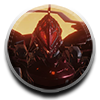
"G-General..... Ironwood........Is that... you?" The voice of Cordovin would come from the Mechs speakers as the "helmet" lit up looking at the forces down below....
"I.....must.... dispose of you..... General...."
#[The One With False Pride- Cordovin]#[Random Talking In The HQ- Dash Commentary]#//Just doing some practice on how I would write Cordovin having her...#// “I Have No Mouth And I Must Scream” moment
0 notes
Note
Giving it some thought, the entire subplot of trust and truth started in Volume 4, when Qrow first tells RNJR about Salem and the Maidens. Paraphrasing, Ruby says that she believes Qrow because she trusts him, but then asks "Why couldn't you trust me? Why couldn't you just travel with us instead of all this... secrecy, and-". I don't know what to make of it, because even back then it felt a little... I don't know, heavy-handed? And then it's made a central theme of V7 and it's even more ???
The problem with Team RWBY/RNJR - or rather, the problem with how they’re written - is that they conflate strategy and caution with a lack of trust. Meaning, the people around them have very good reasons for not divulging certain information at certain times and/or not doing certain things at certain times because that’s dangerous. It’s not a matter of trusting someone in the way Ruby means (willing to follow someone, willing to believe that they’re striving for the right thing) but a sheer matter of practicality. Qrow says it straight out: “this has nothing to do with trust.”

Why didn’t he travel with them? Because he has a bad luck semblance that does all sorts of awful things to the people around him, like drawing more grimm, causing beams to fall, or tires to blow on your one mode of transportation. Qrow didn’t travel with them because that was the smart, practical move in a hostile world, not because he doesn’t trust his niece. Now, we can change the question to, “Why didn’t you trust us with the knowledge of your semblance?” and that gets into the complicated can of worms, “Because this has been a traumatic thing that I’m still working through and I’m terrified that people will leave me when they find out about it.” A fear that more of this group should understand by now. Why didn’t Jaune immediately tell his team that he snuck his way into Beacon? Why did Blake hide that she was a faunus? Do we even see Ruby tell her teammates about her super secret eyes or does the narrative just assume that everyone found out at some point (I honestly don’t remember...)? Everyone has secrets and parts of themselves that are incredibly difficult to talk about. The inability to admit to them unless pressured - which is precisely what Nora does to Qrow here - is not an indication of a lack of trust. It’s an indication of the group’s lack of emotional maturity that they thought then, and still think now, that everyone around them owes them every single piece of themselves. It’s an immaturity seen most overtly in Yang who believes that Ozpin isn’t trustworthy unless he divulges every piece of information that might possibly be deemed a secret, while simultaneously keeping secrets about her Mom being the Spring Maiden, Salem’s immortality, and Robyn’s knowledge of Amity. It’s a child’s logic to honestly believe, “Well this applies to you but not me because I’m just different.” A perspective that I thought the group was being set up to grow out of.
Because this theme of trust vs. practicality continues in the conversation when Jaune wants to know why the whole world hasn’t been told about Salem. Qrow, via Ozpin’s teachings, has very smart and proven reasons for keeping things quiet:
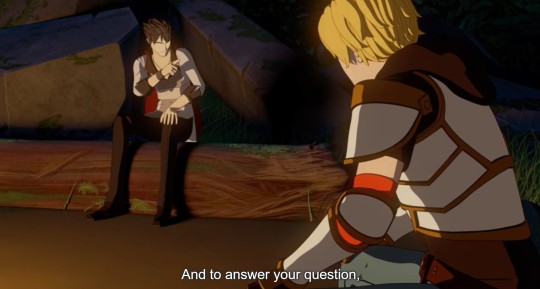
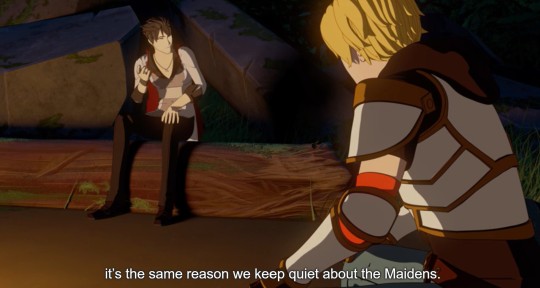
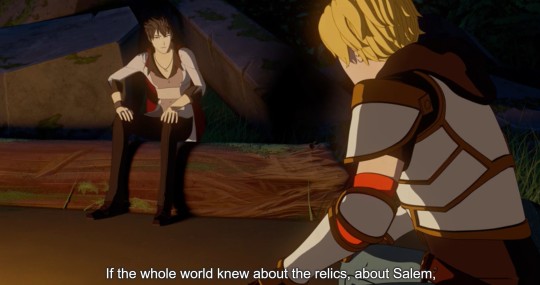
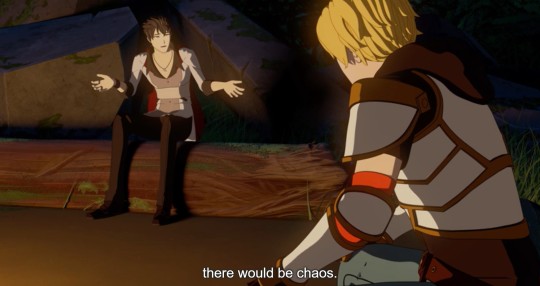
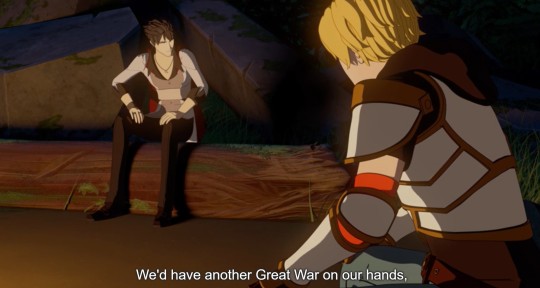
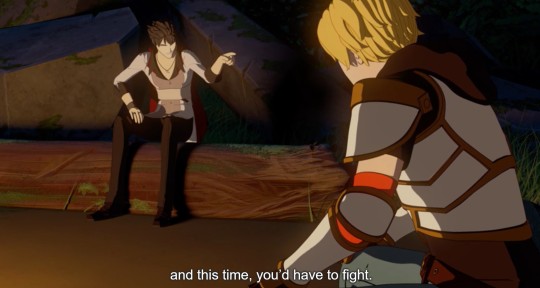
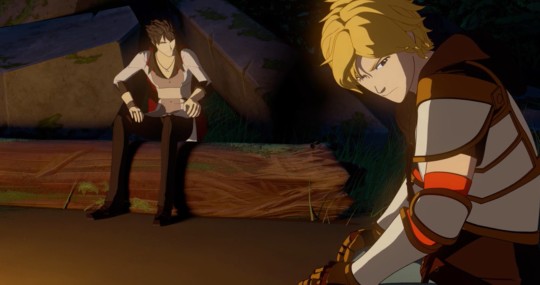
“Hey,” asks the teenager who has had one year of combat training and has only been in one non-grimm battle, a good portion of which he spent arguing with his teammate and trapped in a locker. “Why haven’t we told the whole world about the woman out to kill them and the magical relics she wants?”
“Well,” responds the elite huntsmen who has been fighting in this war at least as long as they’ve been alive, “Because history has shown us that people panic when they learn stuff like that. Murder young women for their power panic (women like Pyrrha!). Try to steal the magical relics for themselves panic. Turn on each other panic. Start a new war between kingdoms and descend the world into chaos panic. And, as they’re about to find out via Lionheart, Join the witch instead of fighting her panic. We see in that final shot of Jaune that he doesn’t like hearing this, but he seems to understand it. Grudgingly. Problem is, this understanding doesn’t last.
With all the info out in the open Ruby asks what they’re supposed to do and Qrow responds with,
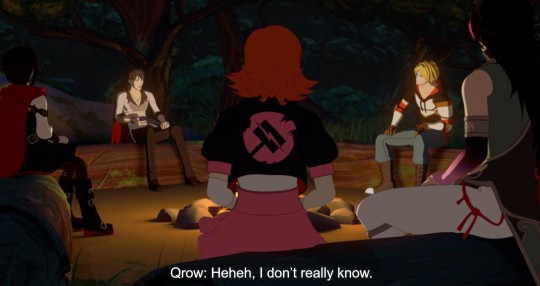
The looks everyone exchange are terrified.
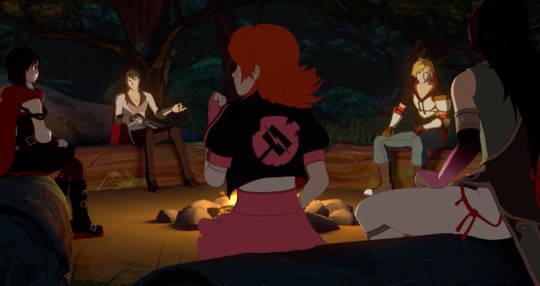
For the record, this isn’t bad writing. They’re barely trained kids. They should be looking to their authority figures and then be blindsided with the adults don’t have one easy, magical solution to grant them. That’s a part of growing up. What Qrow offers them instead is the adult solution: we do what we can. We’ll continue on to Haven where Lionheart should have been making preparations. We’ll see what he knows and work from there. Sorry I don’t have a ‘Defeat Salem and Make Everything Perfect’ plan hidden up my sleeve, but this is what fighting a war is really like.
What does all this have to do with trust? The fact that the group learns nothing from this conversation. When more information about Salem is revealed - her immortality - Ruby asks the same question of Ozpin that she did Qrow: So... how are you, as an individual, going to fix everything for us? When he, like Qrow, has nothing simple to offer them they turn violent (and the fact that Qrow expressed the most overt violence just goes to show how little RT bothered to think through how each person would respond to this information). The group continues to conflate information with trust. Information in terms of “Share all your secrets” and information in terms of “We expect an easy solution to our problems.” When people fail to provide them with that - such as Ironwood having a plan but it’s not a plan they like because it hurts Mantle - they’re deemed “untrustworthy.”
Now again, this isn’t necessarily a bad thing... if the group were on a track to grow out of this behavior. It’s not a bad thing to have Ruby be pissed that (to her mind) Qrow didn’t trust her, to think that Ozpin is untrustworthy because he didn’t share everything with them... and then slam her into a situation where she has the information and she realizes, “Oh shit. I’m too scared to tell Ironwood this right out. I want to keep this information hidden until I’m sure it’s safe to share and I feel it’s the right time. Even then it’s really hard to share it... Uncle Qrow and Ozpin were right.” Instead, the writing did the exact opposite. Ruby’s perspective and her behavior is reinforced - she’s supposedly right to equate trust with sharing ever piece of information, the ability to provide perfection, and people’s willingness to follow her orders to the letter despite her having no power next to elders, more powerful fighters, and military rank - but the story ignores the hypocrisy of her doing the same things she damns everyone else for. She doesn’t share information. She doesn’t follow orders. She has no plan and is set to get everyone killed. The show set up a moment for the group to actually start growing up and mature emotionally in the face of an ethically complicated war... and instead had Qrow randomly insist that Ruby is simply different and special. She is, intrinsically, simply Better than everyone else and you’re not supposed to ask why. By extension, so is her team. Everyone from Nora to Oscar to Jaune insists loudly that telling the council, or Mantle, or the whole world about Salem is the One Good Answer here despite the fact that the narrative - via Qrow above and in numerous key scenes since Volume 3 - has given us numerous reasons why that’s a terrible idea and zero reasons why it’s a good one. But the story is no longer interested in weighing these perspectives and having the characters learn to make informed decisions. Even when lives are on the line.
It comes down to an incredibly biased perspective by the writers. By working under the ironclad assumption that your young protagonists are always right and your older supporting characters are inevitably wrong, you get situations wherein we’re shown a situation where Team RWBY is wrong and the adults do have a point... and then we swerve at the last second to insist otherwise. Qrow is shown as having good reasons for keeping his distance, but Ruby says he didn’t trust her. Cordovin has good reasons for not letting kids across a closed border, but Ruby says she forced them to steal. All evidence points to the Ace Ops kicking Team RWBY’s ass, but Ruby says they’re stronger. That’s what drives the show nowadays: whatever Ruby claims is the truth. If the show actually followed what it had laid out on screen, rather than what Ruby insists to be true, then this show would now be a tragedy. Here’s the story of what happens when you give traumatized teens the power to try and save the world. Being forced into this war so early and receiving the gut-punch that the adults around them are imperfect immediately after a near kidnapping is something they couldn’t handle. The nuance of a 1,000 year strategy-based war is something they couldn’t handle. When you take a girl who wants to fight monsters like in the storybooks and put her in charge years before she’s ready... she’s going to insist that life will turn out like a storybook. So she’ll bravely fight an immortal witch with an army under the assumption that everything will somehow turn out alright. Except it doesn’t and everyone dies. The End.
RWBY should have been a story of growth. At this point it logically should be a story of tragedy. What we’ll actually get though is that happy ending based on Team RWBY’s version of “trust” and “friendship” that is inherently contradictory to everything seen on screen... but we’re expected to just run with it because they’re the title characters.
91 notes
·
View notes
Text
What Went Wrong With Clover and Qrow: The Writing Pt. 1
And What CRWBY Could Have Done Better
[Spoilers for all of RWBY Vol. 7]
Now that the final episode for RWBY volume 7 has aired (for first members, at least) and I’ve had over a week to throw my tantrum and air my more emotional grievances, I think now is the perfect time to delve into the mechanics of what I believe went wrong when it came to episode 12, particularly in regards to the writing itself. For those of you who have been following my blog for any length of time, it should come as no surprise to you that in order to do this, we have to go all the way back to the beginning of the volume and break things down. For the rest of you... this is going to be a long post. In fact, it ended up being so long, I’m going to break it down into four parts, focusing on three episodes each up to episode 12.
There are a lot of layers to the anger and hurt surrounding Clover’s death. And while my emotional reaction is still very much there, I really do want to take the time to do this so that people can better understand at least one of those layers. I won’t be getting too much into the shipping aspect in this post or even the queer coding that I personally perceived in Clover’s character. Rather, I’m going to be analyzing the writing decisions and offering my personal suggestions for how CRWBY could have tweaked things to make the events in episode 12, as they happened, far more feasible (i.e. foreshadow Clover’s behavior and remove the flirting, primarily).
Note: This is a critique. I’m not going for negativity here but rather for constructive criticism, where I’ll be acknowledging what CRWBY did well alongside what they could have done better. If you read to the end of part 4 of this series, you’ll find that even after everything, a part of me still very much wants to give CRWBY the benefit of the doubt.
So, without further ado, here we go.
Episode 1 - Clover’s Introduction
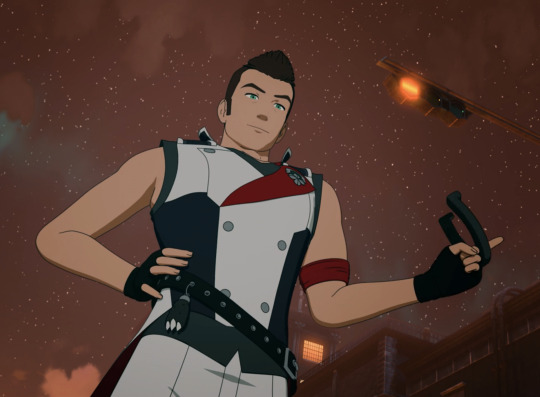
I made a whole post breaking down and analyzing Clover’s introductory scenes in episode 1 where I focused pretty heavily on the animation and the framing. You can read it here if you’d like, but to summarize, the way these scenes play out makes it very clear that Qrow and Clover are going to be linked somehow. These scenes worked, and even in light of the events in episode 12, they still work because things are left pretty open. We have no idea if Qrow and Clover are going to like one another, much less get along to any degree. We just know that we, the audience, are meant to connect them. These scenes, in fact, were done incredibly well.
As far as writing goes, they don’t say a whole lot to one another. In fact, Clover doesn’t speak to Qrow directly at all and the only thing Qrow says is:
“Hey, pal, I’m a licensed Huntsman. Just helped save everyone?”
So... pretty par for the course there. Nothing that really needs to be addressed. This is totally something we expect Qrow to say.
So let’s take a look at Clover’s dialogue. I don’t want to quote every single line, at least not in this particular scene, so I’ll just pull out a few that I think do a great job of setting up his character.
In response to Dr. Polendina asking what the Ace Ops are doing in Mantle:
“Well, we heard a report of an unauthorized ship making an unauthorized landing, followed by an unauthorized use of weapons by non-licensed Huntsmen.”
In response to Dr. Polendina wanting to talk it out:
“They’ll be able to talk this out once they get up to Atlas.”
This is a fantastic bit of writing because it establishes several things at once.
1) Clover is lawful good. The reasons he lists for being there, and the way he emphasizes the “unauthorized” nature of it all, makes it pretty clear that he’s there to do his job. He doesn’t respond to Qrow or even check him for a license, and he rebuffs Dr. Polendina’s desire to talk things out right there. Clover arrests the teams because in his eyes they were breaking the law, and that’s all he really needs to know.
2) It sets him up as Qrow’s opposite in ideology, which is a great way to mirror the opposite Semblance reveal later.
3) It also introduces the possibility of negative tension between him and Qrow. The problem with this is that this tension is never once realized throughout the rest of the volume. In fact, the complete opposite happens and they get along very well. My biggest critique here is that CRWBY absolutely put themselves in a position where episode 12 could have made more sense but then never took it anywhere. Instead, they focused on building up their relationship as a positive thing.
Problem Tally For This Episode: 0.5. There’s really nothing I would have changed about this particular scene because I think it was very nicely done. Things are introduced and set up but left ambiguous enough that we have no idea how things between Qrow and Clover are going to go. The 0.5 is an acknowledgment of the potential set up for the episode 12 conflict that went unused.
Suggested Changes Tally For This Episode: 0
Episode 2 - Making Amends

(^^ I had to go with this screenshot, Clover’s expression is way too good XD)
The end of episode 2 is the first time we see Clover and the other Ace Ops since they arrested the main cast down in Mantle. And... this is where things start to go wrong. Or, perhaps it would be better to say, this is where things could have gone differently. While Clover and Qrow don’t interact in this episode, there are still some key decisions made in regards to Clover’s character.
I’ll pull out the relevant lines and analyze them as we go, then offer up my suggestions for changes.
When the Teams come down the stairs after their meeting with James, Clover approaches them and says:
“I’d like to sincerely apologize for the miscommunication down in Mantle. We didn’t intend to-”
We never learn what it was they “didn’t intend” to do because Elm cuts him off when she practically body-checks him out of the way 😆 But the wording of this line immediately shifts our perspective on Clover a little. He’s no longer behaving like the stringent, unapologetic law enforcer, but is instead acknowledging that he and his team probably messed up a little by not listening/talking to the Teams. It’s a small thing, but it’s our first hint that while he is lawful good, he is by no means unreasonable or unreachable. Contrast him with Cordovin in volume 6 who listens to absolutely nothing, doesn’t apologize, and never budges in her determination to stop the Teams until she has no other choice.
Now, because writing often relies on the tension between various characters’ lines, and because characters are often defined by those around them as much as by what they themselves say, I think it’s important to have a transcript of the following exchange between Ruby, Weiss, Elm, Marrow, and Clover:
Elm: I feel so bad, honestly! If we had known who you were, we’d be laughing over a hot meal right now and--
Ruby: I understand. You were just following orders.
Weiss: I mean, you could have asked us some questions first.
Marrow: Questions are for the weak, but we’re all on the same team now. Not that I’m happy about it.
Clover: We just wanted to say we’re sorry, and that we’re looking forward to working with you on our next mission. You might be students, but you’ve been fighting just as hard as we have, if not harder.
There’s quite a bit to tease out here. Some of it good, some of it not so great in terms of the larger picture and the events in episode 12.
First of all, Elm apologizes. This functions as a reflection on Clover. Good writers find ways to define and build character through the people around them as much as from the character’s own actions and behavior. As the team leader, you expect Clover’s teammates to have picked up on some of his more prominent characteristics and ways of thinking. The fact that Elm not only apologizes but insinuates that knowing who the Teams were would have changed the decisions made in Mantle, suggests a certain level of flexibility. It can also be argued that this foreshadows the fact that at least one of them will go through a change thanks to their association with the Teams. On a deep writing level, that foreshadowing is there, and I’ll make an argument in just a second for why Clover is set up to be that changed character.
But first, let’s look at Ruby and Weiss’s lines, which both serve well to introduce the fundamental difference between themselves and the Ace Ops: “make it up as we go” RWBY, JNOR, and Qrow as opposed to “arrest now ask questions later” Ace Ops. This is good. This works well as the first hint that conflict between them is possible. I have no complaints here.
And then we get to Marrow’s line. This is where things get a little murky but maybe that was the intent. He’s definitely posturing for his team, which is behavior that he exhibits throughout the volume. As the youngest member and the only Faunus on the Ace Ops, this line does a good job of exhibiting that he really wants to fit in with the others, and as such it also doubles as a second peek into the “ask questions later” ideology that the Ace Ops hold as a group. Which is probably something that trickles down from Clover himself, considering he’s the leader. This, also, is fine and works well.
But then....
Clover apologizes again. He doesn’t correct Marrow but doesn’t agree with him either. He doesn’t acknowledge Marrow’s assertions at all. He apologizes to the Teams and this simple act works to reinforce the shift in our perception that he’s possibly more flexible and open to admitting his own mistakes than we might have thought in his episode 1 introduction. And this is the very beginning of the dissonance so many of us felt in his behavior in episode 12.
Suggested Change #1:
My first suggested fix is to change the way that Clover’s second apology is framed by changing his initial apology. Even though he gets cut off by Elm, his first instinct is to apologize for the miscommunication in Mantle. Not only does this tie in so well with one of the primary themes of the volume (miscommunication in all its manifestations), it also indicates that Clover’s character itself is tied to that theme. But his acknowledgment that they probably should have asked some questions immediately frames him as a character who is going to change in terms of that theme. The “we didn’t intend to--” part only adds weight to this hint.
So how could they have fixed this? There are a multitude of possibilities but here is the best I came up with:
>>“I’d like to sincerely apologize for what happened earlier. We were only--”
Do you see the big differences here? Two major things change by altering only a few words. First, in this line, Clover does not acknowledge that he and the Ace Ops made a mistake by not asking questions. He’s still be apologizing for what happened but he's not admitting any fault on his or his team’s part. This would have reaffirmed our initial impression of him as a rigid rule follower, rather than dismantling it a little. Second, the “we were only” would have indicated that, despite his apology, he planned to justify their actions. Again, this would have worked very well to maintain the strict lawful good vibe we get from him initially. These minor alterations would have been subtle enough but strong enough to continue building up to the conflict between him and Qrow in episode 12.
Suggested Change #2:
If you don’t want to change that initial apology, change what he says after Marrow speaks. Have him acknowledge Marrow’s assertions that questions aren’t their thing. You could even have done this through animation with a slight nod or a laugh, but since we’re talking about writing, here is one suggestion:
>>“In our line of work, taking the time to ask questions can sometimes be dangerous. I’m sure you can relate. Regardless, we just wanted to say we’re sorry.”
Again, do you see the difference between this and what we got? What we got brings out the possibility that Clover is somewhat malleable. This, on the other hand, effectively but subtly reinforces his “by the books” mentality, which is exactly what CRWBY needed in order to justify his behavior towards Qrow in episode 12.
I have no suggestions for changes to the lines of the other characters. I think those lines function well in pushing against each other and maintaining a level of tension all around, and they’re necessary for building up to the RWBY vs. Ace Ops conflict. But two very minor and simple changes to Clover’s lines would have continued that initial setup for the episode 12 conflict that was established in episode 1. Instead, CRWBY starts to dissolve it from the get-go.
Problem Tally for this Episode: 1 The biggest problem in this episode is really that Clover’s character immediately starts to shift from “strict inflexible rule follower” to someone who can admit he made a mistake and should probably behave a little differently in the future.
Suggested Changes Tally for this Episode: 2
Episode 3 - Aaaaaand Here We Go
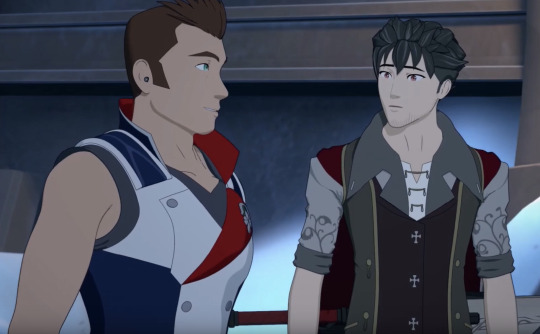
This section is going to be loooong. Not only do we get a lot of Clover in this episode, but we get a ton of him and Qrow together. In other words, we get the first beats of their relationship (again, I won’t be arguing for the shipping aspects, because I’ve done that in other posts and you all know where I stand on that, but their relationship, regardless of its nature, is vital to this analysis).
The first scenes we get in this episode are of Clover briefing Qrow, Jaune, and Ruby about the mission. A lot of it is pretty basic and does a good job of establishing him as an organized, efficient military leader. He’s clearly smart and knowledgable with his strategy.
The first line that really stood out to me in this sequence is the one where he is talking about the Geist:
“But recon has identified a powerful Geist that’s managed to evade destruction and take several lives.”
And this pretty much just serves to establish that lost life is a concern for him. A very good thing to know. It adds a little depth to his character.
After this, we get:
“General Ironwood says you’ve seen your fair share of combat. I trust that man with my life, so tomorrow, I’ll be trusting you all too.”
This is actually a great line for a lot of reasons. First and foremost, it establishes his trust in and bond with Ironwood. It’s a line that gets a lot of emphasis both in delivery and in terms of placement (it comes at the end of his monologue), and it’s one that returns in episode 12 as a sort-of justification for Clover’s actions. This particular line also suggests that his trust in the Teams and Qrow, as of this moment, is dependent upon Ironwood’s opinion of them. He trusts them because Ironwood has vouched for them and not because he has any reasons of his own to do so. This actually works really well and I wouldn’t suggest a change.
The problem in the narrative again comes from what happens outside of this line. The tension suggested here is never carried forward or built upon. In light of this, and because of the direction his relationship with Qrow takes, this line doesn’t work well as a foreshadowing of his actions in episode 12. Rather, its narrative function falls more in line with hinting at the potential for change that was introduced in episode 2. It does do a good job of setting up Clover as the one who is going to have to make a choice between his absolute trust in Ironwood and something else (whether that’s his own judgment or his trust in Qrow or whatever), but because of the writing outside of this line, it completely fails to build up to the events in episode 12 in a way that is convincing. In fact, it does the complete opposite. Because of this line and the way Clover is written in the rest of the volume, we are set up to expect an internal struggle from him in episode 12, not blind obedience.
Moving on to the scene where he and Qrow have their first one-on-one interactions. As you can probably predict, here is where things start to go to absolute shit. Up to this point, CRWBY still had what they needed to pull off episode 12 without it feeling ridiculously contrived. Sure, they played around with Clover’s character a little, gave us enough nuance in his narrative to potentially pique our curiosity, but they hadn’t passed the point of no return yet. Here, however, is where they start to.
Because of that, I’m going to quote large chunks of the script between Qrow and Clover, and pull it apart as best I can. Here is their very first conversation of the entire volume:
Qrow: Gotta say, I’m still not really used to working with other Huntsmen in the field.
Clover: But you were on a team before, weren’t you?
Qrow: (sighs) Long time ago. I just found working alone tends to be for the best.
Clover: Well, I think that’s a shame.
[Qrow slips and nearly falls before Clover catches him.]
So there are actually quite a few things going on here and they all contribute to the overall problem with the writing in this volume.
First of all, despite Qrow’s previously established dislike for the Atlas military in earlier volumes, and despite being arrested by Clover in episode 1, there is zero animosity or negative tension here. He seems more than willing to work with Clover and is even comfortable enough to initiate conversation and open up a bit. There is nothing of plot relevance in this scene. It is solely and specifically meant to give us the first hint of what their relationship is going to be like.
The major problem I have with this, in terms of the overall story that pans out between these two, is that CRWBY already had an inbuilt way to introduce a little negative tension. They could have easily called back to Qrow’s not-so-great opinions about Atlas military huntsmen, even if not overtly, and that would have worked really well as a stepping stone to the episode 12 conflict. But that’s not what we get.
Instead, Qrow opens up about something personal (being alone) and Clover is shown to be sympathetic. Clover’s sympathy here is another major mistake made by CRWBY when we take into account one of Clover’s lines in episode 12. I’m not going to watch it right now to get the exact wording, but it’s something along the lines of “There’s that cynicism of yours”. It’s a line that comes across as cruel and impatient, and it comes out of absolutely nowhere thanks in particular to the exchange above, their interactions later in this episode, and the episode 5 truck scene.
Right here is where CRWBY had the opportunity to at least partially rectify that very specific problem, but it doesn’t happen. We are given no indication that Clover thinks any less of Qrow for this reveal, and are instead given a glimpse at the patience and kindness that he is capable of.
Suggested Change #3:
The easiest way to fix this would have been to remove Clover’s sympathy, or at least insert a little condescension into it. This could have been done without making him an outright ass, and therefore CRWBY would have been able to keep us invested in at least wondering where this is going to go between them while simultaneously giving us one of the hints needed to make episode 12 believable. All it would have taken was altering Clover’s final line in that exchange.
Here are a few possibilities:
>> “Hmm” - delivered in a way that communicates his judgment or at least something noncommital
>> “That doesn’t seem like a good idea.” - critical
>> “That’s a bit much, isn’t it?” - dismissive, condescending
>> “I have a hard time believing that.” - dismissive
>> “Is that right.” - dismissive, condescending
>> He says nothing and it’s up to the animators to communicate his judgment.
Suggested Change #4:
The slightly more difficult change they could have made here would have been utilizing Qrow’s established distaste for authority and the Atlas military in general. Here is one potential way that could have gone:
>> Qrow: Gotta say, I’m still not really used to working with other Huntsmen in the field.
Clover: But you were on a team before, weren’t you?
Qrow: Long time ago. Playing with others isn’t really my thing. I found working alone tends to be for the best.
Clover: Well, I think that’s a shame.
In this case, you could keep Clover’s last line because instead of Qrow opening up and being vulnerable, he’s actually being a bit more antagonistic, which would have been plausible given his behavior towards Winter and James in volume 3. Clover’s line, in this context, becomes much more ambiguous and open to interpretation, which would have fed well into the episode 12 build-up.
Moving on again to their next interaction in the mines right after the Geist escapes:
Clover: Thaks for the call-out. That could have been bad.
Qrow: (sighs) I wouldn’t thank me. My Semblance brings misfortune. Sometimes I can’t keep it under control.
Clover: That so? Well, hey, don’t beat yourself up about it. My Semblance is good fortune. Lucky you, huh?
Again, there is quite a bit going on, not only in these lines but in the lead-up as well, so in order to maintain perspective, I’m going to backtrack just a bit to when Clover caught Qrow after he slipped on the ice. The next major beat in their relationship after that event is Qrow warning Clover to prevent him from getting crushed by a falling beam.
These two things paired so closely together suggest that real trust is starting to develop between them. It’s not trust vouched for by someone else, but the trust that comes from being in a dangerous situation together and coming through for one another. At the bare minimum, the foundation for trust is laid here and with nothing to undermine it (because of the writing thus far), there is no reason for the audience to doubt that it will continue to develop and strengthen.
Then we have the lines above.
Again, Qrow opens up about something deeply personal here. He is showing unusual levels of vulnerability for him, which suggests that even if the audience doesn’t quite understand it, Qrow has found a reason to want to open up to Clover. It points towards an immediate level of comfort that we have never seen from Qrow before and that is something that can’t be ignored.
As for Clover, I suppose we could argue about the nature of his response to Qrow’s vulnerability. I know some saw it as Clover being dismissive of Qrow’s pain, and if that had been how the lines were delivered, this might have worked very well in building up to a conflict between them. This is one instance where we need to step outside the words themselves and take into consideration the aspects surrounding the words: the animation and Chris Wehkamp’s line delivery in particular (which I assume were directions written into the script).
One of the biggest problems here is that this was yet another opportunity for Clover’s impatience with Qrow’s cynicism to be established. And yet again, that’s not what we get. Instead, Clover takes Qrow’s Semblance in stride, reassures him that it’s not something he needs to worry about, and then offers up a comparable piece of information about himself: his Semblance is good fortune. There is no indication in the writing, line delivery, or animation that he finds Qrow’s attitude distasteful or annoying, and there could have been.
The other major problem with this is, again, the nature of Clover’s final line. I promised that I wouldn’t get into the shipping aspect and I won’t, but at the very least I think everyone can agree that the “Lucky you, huh?” quip at the end is intended to be friendly. This is the first time we learn something personal about Clover and it’s also the first time that his behavior towards Qrow shifts from being purely professional to something else. This shift is maintained and built upon throughout the volume and I’ll comment more about it in just a bit.
None of this builds up to what happens in episode 12. CRWBY lays the foundation for a healthy and functional relationship between these two, hints at the beginnings of real trust between them, and completely foregoes all opportunities to insert some of the negative tension that was sorely needed for episode 12 to make sense.
Before making some suggestions for changes, I’d like to take a second to really emphasize this point: prior to these two scenes, the audience has little to no reason to believe that these two are going to get along. Clover is elite Atlas military and Qrow is... well, Qrow. We already knew everything we needed to know about them to make the inclusion of that necessary negative tension ridiculously easy. All CRWBY had to do was play them off one another in a way that leaned on this prior knowledge. This is not only sloppy writing in light of episode 12, but this is also the active and intentional subversion of our expectations where these two characters are concerned. This puts us into a bit of a quandary, really, because how can something be both careless and yet so intentionally done? It’s not a question I’m going to try to answer here but I think it’s one worth keeping in mind as we move forward.
Suggested Change #5:
Remove the friendly/flirty nature of Clover’s final lines and instead write them in such a way that he seems a little more callous and irritated with Qrow’s attitude. Again, he doesn’t need to be such a jerk that we hate him off the bat, but including a little hint of negative emotion would not have been difficult here.
For instance:
>> Clover: That so? Well, don’t worry about it. Luckily, my Semblance is good fortune.
See how different that is? Dismissive, potentially irritated, and it brings the focus on to Clover and his Semblance rather than putting the focus on Qrow and what a good fortune Semblance might mean to him, which is how the original script functions. The very last line that I suggest also serves to put Qrow down a bit in a very subtle way rather than having Clover flirt with/be friendly towards him. It’s basically a “whatever, things will be fine despite the fact you’re here”.
Moving on from this, we get the following:
Clover: Charlie, Bravo, you should be able to cut off the target at the heart of the mine. Qrow and I won’t be far behind.
Again, this line is a relatively small thing all on its own, but in context with the scenes that precede it, there is actually a lot more going on here than might appear at first.
I didn’t quote it, but when Qrow and Clover first land at their assigned mine entrance, Clover refers to himself and Qrow as “Alpha Squad”. Here, that changes to “Qrow and I”.
Not only does this support and reinforce the change in Clover’s attitude toward Qrow with the “Lucky you, huh?” line (going from professional to something else), but Qrow is specifically named. There is not only an inherent intimacy that comes with using a person’s first name, but it’s a very subtle and effective way of framing Clover and Qrow together as a pair. This further feeds into that set-up I was talking about in episode 2 where Clover is presented as the most likely character to change as a result of his association with the Teams/Qrow, particularly in the absence of negative tension and the efforts by the writers to subvert our expectations in that regard.
Do you see where things are starting to stack up in the completely wrong direction? It gets worse in just a minute but first...
How do you fix this? Again, it’s easy. Considering Clover is military and codenames are a thing heavily used, it would have made more sense for him to at least refer to the two of them as “we” or even revert to “alpha squad”.
Suggested Change #6:
Make a slight alteration to Clover’s line so that he reverts to pure military professionalism.
>> Clover: We won’t be far behind.
>> Clover: Alpha squad won’t be far behind.
Pretty simple. Either change works. Even though the shift that comes with “Lucky you, huh” would still have thrown us off a bit, Clover’s return to his norm would have signaled to the audience that the perceived change was fragile at best, and possibly even a complete fluke of Clover’s personality. It also maintains a level of emotional distance between Clover and Qrow that we really did need for episode 12 to work. Instead, CRWBY made the choice to close that distance. Significantly.
Now it gets worse. We go into the scene in the main chamber where Clover and the Ace Ops take down the Geist. The obvious bit of dialogue here that merits attention is Clover’s following line after catching the piece of Dust in reference to the other Ace Ops:
Clover: What would you guys do without me?
I think this line might be one of the most disappointing because it could so easily have foreshadowed Clover’s death. But instead, due to what came just before and what comes after, this line sets up an entirely different conflict. In fact, it does a beautiful job of pretty much cementing Clover as the character who will change the most because of Qrow and the Teams, and who will have to choose between Ironwood and his own moral code. Do I suggest that from here on out, him choosing Qrow over Ironwood was absolutely set in stone? Not at all. In fact, that wouldn’t have made sense for the narrative or Clover’s character. However, Clover’s unflinching blind obedience and immediate willingness to arrest Qrow in episode 12 are completely undermined by this set-up. We expect to see him struggle with that decision, regardless of the ultimate outcome, not turn into a drone who does exactly what he’s told.
Additionally, thanks to the set-up we get throughout the volume for the RWBY vs Ace Ops fight, this line feeds into that tension in particular. The problem here is that the second we see the Ace Ops act to arrest RWBY without hesitation, this tension is resolved and we have our answer. We know exactly what they do without him and all that’s left to see is the unspoken second half of this question: What would Clover do without them?
If I could include an illustration of how far CRWBY was leaning away from foreshadowing Clover’s death and callousness in episode 12 up to this point, we’d have ourselves a goddamn Tower of Pisa.
There is no specific fix here because the problem isn’t with this line itself. It certainly could have functioned to foreshadow Clover’s death, but again, because of the rest of the narrative, that’s not what it ends up doing.
I want to step away from the dialogue for just a moment. I know I said I wouldn’t be focusing on animation, but considering animators take their directions from the script and storyboards, it does technically qualify as writing even if I can’t give you word-for-word what those directions were. There is something in the animation in this particular scene that we can’t ignore.
Clover’s behavior directly following the line above (he tosses the Dust to Qrow, gives him a loose and playful salute, and backward swan dives off the cliff into the pit where the Geist is) is a massive, screaming augmentation of Clover’s shift towards Qrow specifically (i.e. away from strictly professional and towards something else). The “lucky you, huh” line and the use of Qrow’s name right before this pulls us very nicely into this new dynamic.... But this dynamic is exactly the thing that makes episode 12 so outlandishly out of place.
Moving on to the final Qrow/Clover interaction for this episode. After the Geist has been defeated and Ruby makes the day-saving catch, we get this:
Qrow: Lucky catch, huh?
Clover: Hm, no. I’d chalk that one up to talent.
One of my issues with these lines is that they serve to once more highlight the shift that has occurred between Qrow and Clover, particularly because it gives us some invaluable insight on Qrow’s feelings towards Clover’s Semblance. Here is another area where the light-hearted delivery Jason Liebrecht (Qrow’s VA) gave factors in a bit. A lot of us had no idea how Qrow was going to react to learning that someone else had a Semblance opposite to his own. He could very easily have been upset or resentful or even self-effacing, but instead, he absorbs the information, takes it in stride, and proceeds to joke about it in a way that I just realized mirrors Clover’s “Lucky you, huh?” line. This is basically Qrow shifting seamlessly into their new dynamic and accepting it.
The other major problem here is, once again, Clover’s characterization. This has all been building up pretty badly to episode 12, as I hope I’ve illustrated, but this final exchange is really the last good chance CRWBY had to pull things back on track a bit. Only they don’t take it. They could have had Clover display a bit of arrogance or dismissiveness in this scene. It would have worked well to at least let us know that the personality he has displayed so far might be more of a front than anything, and if done right, his coldness toward Qrow in episode 12 wouldn’t have been totally unexpected. Instead, we get to see a man who gives credit where it’s due and absolutely believes that his Semblance is not everything. In other words, we get a Clover who is drastically different from the person depicted in episode 12.
Suggested Change #7:
Change Clover’s final line to clue the audience into the fact that he is not what he seems and hint at a darker personality lurking under the surface. Here are a couple of options
>> Clover: It was.
>> Clover: That’s one way to put it.
Problem Tally for this Episode: 14
Further set-up (at least 2 major instances) for Clover to be the one who changes or at least struggles with having to choose between Ironwood and Qrow/disobeying orders. Multiple instances (3 significant by my count) where Clover’s characterization fails to match what we get in episode 12. A failure to lean into the pre-established negative tension between Clover and Qrow by virtue of who they are. An active subversion of the expectations that could have easily supported that negative tension. The shift in Qrow and Clover’s relationship which is never recanted in any way, followed by no less than 4 instances of reinforcement. The beginning of the closing emotional distance between Clover and Qrow. A line that could potentially have acted as foreshadowing undermined by what comes before and after it.
Suggested Changes Tally for this Episode: 5
Total Problems so Far: 15.5
Total Suggested Changes: 7
Do you see where all the little, tiny things are starting to add up? And do you also see where only a few small changes could have been implemented to make episode 12 something that didn’t hit the audience like a freight train? The thing is, not all of these changes would have been necessary. A few of them would have sufficed.
I hope this has been helpful in shedding some light on a portion of the reason why people are so upset by what happened in episode 12. I’m going to continue this analysis as soon as I can, with the next part covering episodes 4-6. With school and everything I’m not certain how soon it will be out, but look for it sometime over the weekend or at the beginning of next week.
#clover deserved better#fair game#clover ebi#qrow branwen#rwby#rwby7#rwby critique#what went wrong in the writing#blog series
197 notes
·
View notes
Text
RWBY IN RETROSPECT - THE TRAILERS AND CHARACTERS
Hi! My name’s Dahki. I’ve wanted to write out my thoughts, criticisms, and praise of RWBY for a while now and offer my two cents into the vast void of discussion. I started watching during the Volume 3 hiatus at the wish of one of my friends, and kept watching ever since, save for a small hiatus during Volume 5. Now, I want to take a look back at the show I enjoyed so much and talk about what it did right, what it did wrong, and - spoiler alert - tackle many, many criticisms made of the show - and some praise - and expose it as it is: simply... false. Now that I hopefully have your attention with such a bold claim, why not dive right in?
This post will cover the trailers and how they serve as introductions to the characters, along with the first chapter discussing a common criticism of the show I felt best to put here - namely, what the show actually revolves around. (Spoilers: RWBY is not predominantly plot-driven show, or a fight-driven show, or even themes!)
NOTE: My analysis comes from the content I’ve consumed - the show itself, and some pieces I can remember from the World of Remnant, which I believe is a positive as I can more critically examine the show how it actually is presented, rather than creators telling me how things were meant to be.
CHAPTER 1: Of Monsters And Men
yes, i’m titling my segments vaguely and dramaticly, no you can’t stop me.
An important part of any piece of content is the expectations you build and what you promise, and I wanted to designate a chapter of this post to talking about that. I’d also like to take this chapter to immediately dispel a longheld criticism/observation of the show that, quite frankly, is complete and utter bullshit.
Television and visual storytelling is a medium where you can’t rely on beautiful prose to carry you. No matter how pretty your show is or how good it may be to look at, it doesn’t matter. You will never keep an audience based solely on things looking pretty. This may seem obvious or like I’m preaching to the choir, but stay with me.
There is a common criticism about RWBY being a show that exists only to indulge in the spectacle of its big fights and nothing more. While I’m not here to say it’s wrong to only watch RWBY for the fight scenes - do as you wish - to actually say this as some kind of real criticism is so baffling and ill-founded it can be dismissed almost instantly. The fights in RWBY are one of its main selling points, but as I said earlier, no amount of visual eye candy will ever carry a show to anyone who actually cares what they’re watching. So lets get this out of the way.
RWBY is not a show about fights. RWBY is barely even a show about plot or story elements or themes. RWBY is not a show teaching lessons or tackling hard topics. What RWBY is actually about - while it INCLUDES other elements as all shows do - is what it TELLS YOU it is about the instant you read the title.
Its characters.
If RWBY were truly about a plot, we wouldn’t have spent three volumes completely in the dark about what the plot actually is. If RWBY were about Ozma vs Salem’s eternal struggling conflict, or even RWBY defeating Salem, we would know about it sooner than Volume 6 came about. But the hard truth is that while RWBY as a show includes these elements in their story, that story came secondary to the characters. RWBYs three priorities are, in order, its characters, then its plot, then its fight scenes.
The first two volumes of RWBY amount to nothing. You could remove them completely, hamfist a few missing details from them into volume three, and you could go from there if you wanted to tell a grimdark story from the word go.
The decision to start RWBY the way they did, with interpersonal conflicts that don’t matter in the long run, proves my point. Does anyone care about Jaune forging his way into Beacon? No. That was a plot point from V1 to create conflict and get us attached to the characters and build on them. RWBY started out with a soft and simple premise with darker undertones for two reasons: to create the show-stopping volume three finale which completely switched the show around and to force us to care about these characters; to give us reasons to root for them. RWBY started slow because you always start a character driven show slowly, or else they’re going to be perpetually outshined and outpaced by the everlooming need to combat some greater evil. Weiss warming up to Ruby and growing to respect her as a leader naturally, or her making up with Blake at the end of Volume 1, says a lot more about her character than if she were forced to stand by them because if she doesn’t she will literally die.
What brought everyone into RWBY at the beginning may have been the fights, sure. But what kept us around was the characters. Not the plot - because there wasn’t any. Not the fights - because they’d eventually get stale.
And the kicker is that this is all great. This is all fine. There isn’t anything wrong with this. Interpersonal character conflicts can be just as interesting as world-ending stakes; far more people remember Blake and Yang vs Adam than they do the fight against Cordovin, because while Cordovin’s fight is more important to the plot by ensuring they get a way to Atlas, Blake and Yang’s fight vs Adam was the culmination of their entire arcs thus far and practically defined their growth as characters. If Blake and Yang had lost their fight and had to retreat, it would have no impact on the plot, just the characters involved.
So why did more people care about that fight? Why do we remember it more? Why is it a highlight of the show?
You already know why because I’ve spelled it out. It’s a character-focused conflict versus a plot-focused conflict.
CHAPTER 2: RUBY “RED” ROSE
In these chapters, I want to touch on how the trailers act as a little more than simply performative set pieces - as a good trailer should!
...Unfortunately, the Red trailer offers pretty much nothing into Ruby as a character no matter how many times you watch it.
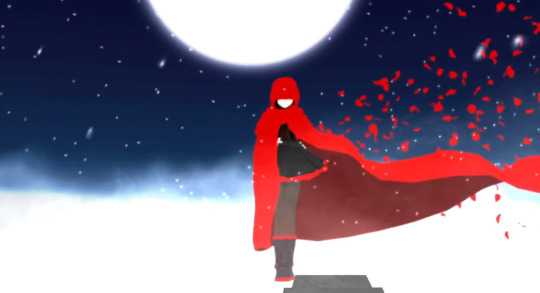
The first thing we see of our main character is her standing at what we now know is Summer Rose’s grave. The face hidden, weak pose, and even the petals scattering in the wind accompanied by the acoustic guitar all give vibes of a soft sadness. She’s hiding her face as if in mourning, wields no visible weapon, and if Ruby is represented by a rose, petals breaking away from her almost give the impression she’s falling apart.
This continues with a different shot as we get the vocals to Red Like Roses beginning - yes, I’ll be analysing song lyrics since I’m analysing character and these are basically theme songs.
...But there’s nothing to analyse like with most of this trailer, which is understandable. As always in this series of posts I’m not going to shy away from criticism though. This trailer was stated to be more of a “weapon demonstration” by Monty, which is easy to see - especially when contrasted with the other trailers practically dripping with character. All we truly see of Ruby is her kicking ass of Beowolves, and the whole “moving about with recoil” that she and Yang both use - but Ruby moreso as time goes by.
CHAPTER 3: WEISS “WHITE” SCHNEE
As I said earlier, though, the other trailers are dripping with so much personality to unpack I would hardly believe them to be related. Unlike Ruby’s impassive face tearing up hordes of Grimm, Weiss’ trailer shows a side of her that - with how she’s presented in Volume 1 especially - is practically required to prevent us from hating her from the word go.
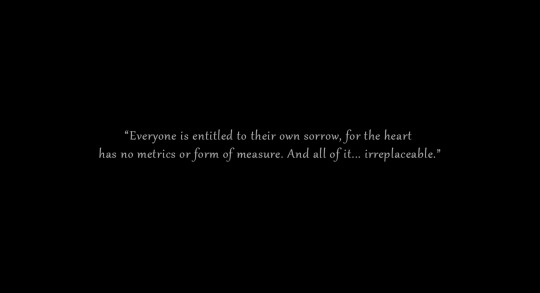
The White trailer opens us up with a quote that defines how we’re supposed to interpret Weiss. Instantly you’re told it plain and simple: the character you are about to meet is sad, and no “perfect” life will fix that sadness. From this quote alone, when we meet Weiss in the show, we know that behind her cold exterior, she’s hurting badly - and this trailer shows us a few reasons why.
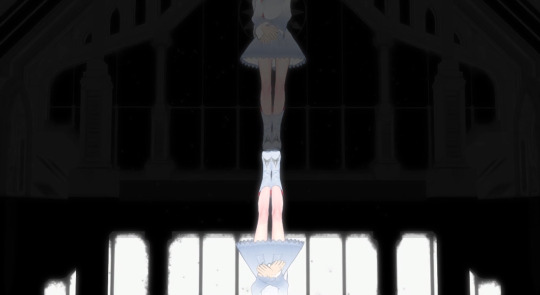
This transition is interesting. We’re moving downwards, to the opposite “reflection”, and seeing what’s going on underneath the surface of Weiss. It’s a clever piece of visual storytelling to convey that this is a side of Weiss others don’t see - such as the crowd she’s singing to.
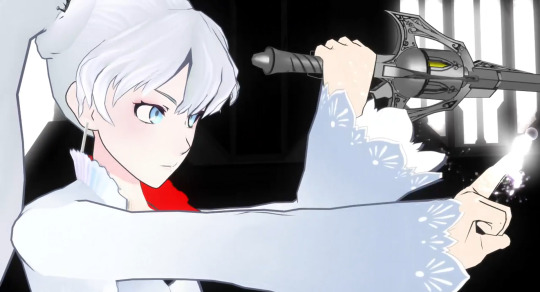
One of the best parts about Weiss’ trailer is how it conveys the greatest defining trait of her character with no words and no context. Her defiance.
Weiss’ trailer is a complete difference to Ruby’s casual badassery, Blake’s inner turmoil about Adam (oh boy I can’t WAIT to get to that--), Yang’s casual and fun atmosphere - and the fact that all three of them kick major ass in their trailers.
Weiss? Weiss gets her ass handed to her and a nasty scar until she narrowly etches out a win. Weiss’ attacks do nothing to this random suit of armour, and yet she doesn’t stop trying, and through creative use of her Semblance and Dust, wins. Weiss was never gifted a Semblance like Yang’s to simply obliterate anything in her path. Weiss has to carefully use her tools to win; something we see all the time in the actual show.
Weiss is not a natural born fighter in the sense of actual physical combat. Weiss loses many fights in the show, her wins are rarely clean, and in the trailers she’s portrayed as practically the weakest based on this alone - we don’t see her shine with no conflict. We see her struggle and overcome it. Alone.

Just look at the sadness on her face when she’s beaten down again and gets her scar; I remember this tugging at my hearstrings when I saw it.
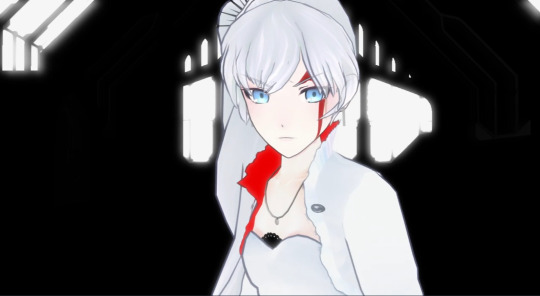
But for how frail she may look, and all the illusions to ice, snowflakes, and snow; she always stands up again. If you critically watch this trailer, you see her sadness, her determination, and her eventual triumph; you can see so much of her character in it already. The fights in this show are so good for many reasons; one of the most compelling is the justice they do to their characters and the ways they advance them.
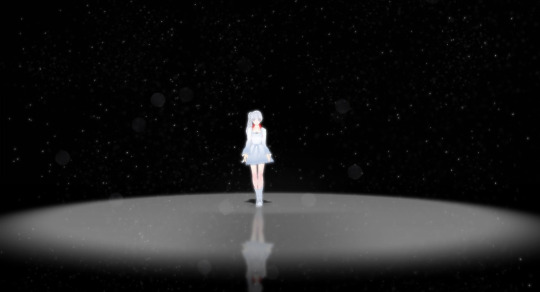
True to her song, we never see Weiss with another character in her trailer.
CHAPTER 4: BLAKE “BLACK” BELLADONNA
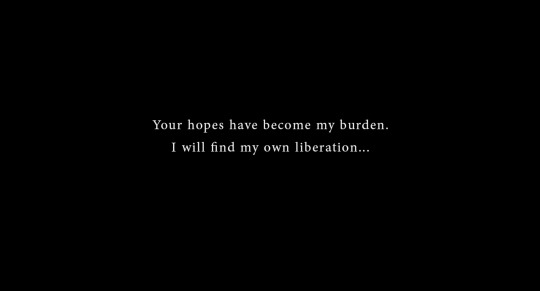
Again, we open with a quote! This quote immediately centralizes Blake’s primary conflict in the beginning of the show: Adam and Faunus rights. The liberation they seek is liberation from their discrimination and freedom; ‘my own’ is important because the liberation Adam is shown to seek is different to what Blake wants, reinforced by this. This entire quote seeks to convey how Blake and Adam were once on the same page, but have begun to disagree and drift, and now Blake seeks escape. As we learn in the show, this is no ordinary disagreement, but a product of Adam’s extremism. Adam’s dreams of overthrowing humans “burden” Blake, and so she does what she does best: leaves.
Good choice, though, considering how fucking creepy Adam is.
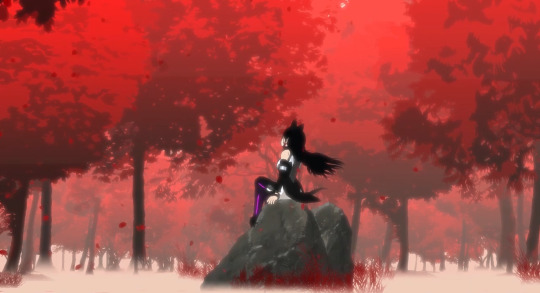
The very first thing we see of Blake is a shot that can only be described as melancholic. The combination of soft vocalisations, her pose, the scenery, the piano, her sitting alone; it all works off each other to convey a sense of melancholy and... loss. With how important colours are in RWBY, I find it might be worth mentioning the amount of red on the screen and how that could tie to Adam, but I can’t find the words right now.
Regardless, you immediately get a grip of Blake’s character from this introduction. While it may be hard to vocalize, a character you introduce like this is not going to be screaming and shouting and yelling unless you’re seeking to subvert expectations for humour. With how serious this introduction is (for an example of a less serious introduction, Cordovin!) we know that won’t be the case.
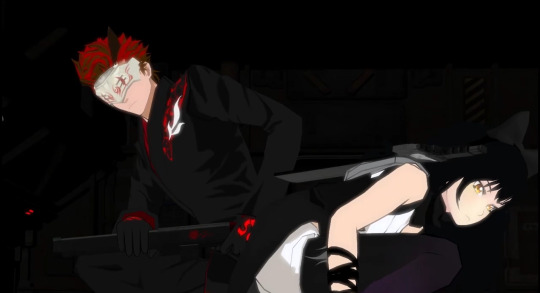
Showing off these characters ambushing a train is an immediate way to set off alarm bells in someone’s head in regards to “am I supposed to root for these guys?”. The trailer does a good job of showcasing Blake’s compliance, but lack of any real drive to do harm. Adam is the one to instigate the conflict and tells her it’s time to attack the train. It isn’t until the end we see her leave, painting clear as day Blake’s discomfort with his practices and giving us an easier reason to like her. She takes a stand against a character we aren’t supposed to like, because generally speaking, good people don’t randomly attack trains, and a trailer isn’t the place for Robin Hood dynamics to be fully explored.
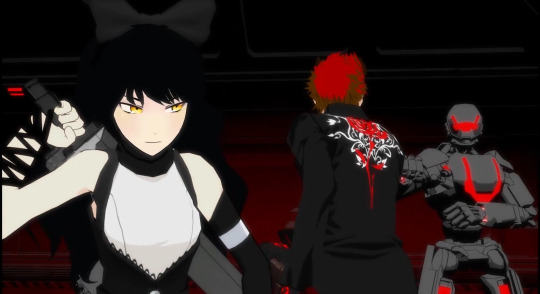
“Don’t be so dramatic.”
I don’t have anything to add to this beyond... Blake’s dry wit and sarcasm being shown as early as her trailer, and that it’s one of my favourite Blake quips of all time.
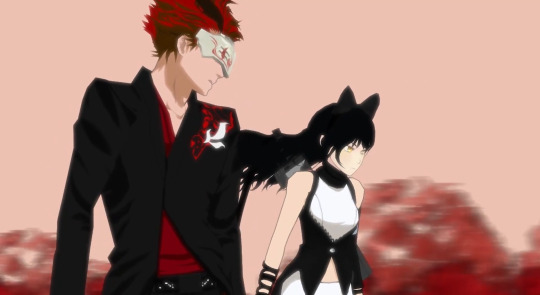
Throughout the trailer, while Blake kicks ass, she’s also shown to be weaker than Adam. Adam is the one to defeat the SpiderDroid for instance, She’s also clearly following his orders, suggesting he’s her superior (toxic relationship dynamics amirite?).
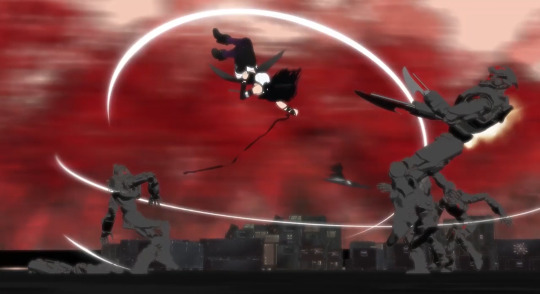
The lyrics in “From Shadows” make it very clear these two are mad about something, which we later learn to be Faunus subjugation. Her trailer featuring Adam and From Shadows being a duet makes it rather clear Adam is a large and central part to her character, like how Weiss being alone conveys her isolation. It has vigilante feels and themes of justice, but it being a duet and Blake leaving at the end leaves you wondering who you’re supposed to side with. Spoiler, it’s Blake, because of what’s coming up.
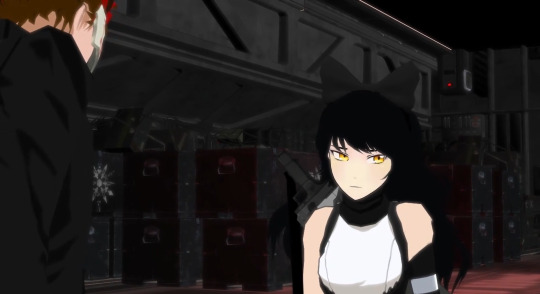
Any part where you’re supposed to side with Adam is instantly gone at this second and it’s made clear which member of the duo has lost their fucking mind. Blake’s obvious discomfort and asking - without prompt - about the crew members present on the ship and how Adam callously plans to have them end up as collateral damage shows where the “burdens” earlier come from. Adam relishes in pain that doesn’t need to be dealt to feel a sense of justice against a world that has wronged them, whereas Blake routinely voices discomfort against it because she hasn’t been blinded by spite. Even the fact Adam is wearing a mask, showing how he’s lost his humanity, feeds into this.
This single scene and everything I outlined here is exactly why “Adam had potential” or “They changed/killed/neutered Adam’s character” arguments are simply wrong. We know Adam is obsessive, we know Adam is vindictive, and as we see in his trailer, we know he’s emotionally abusive and manipulative towards Blake. He even shows it here - asking “what about them?” as if Blake is being ridiculous to care for them.
But I’ll get on to that in time as the show deals with Adam more and more.
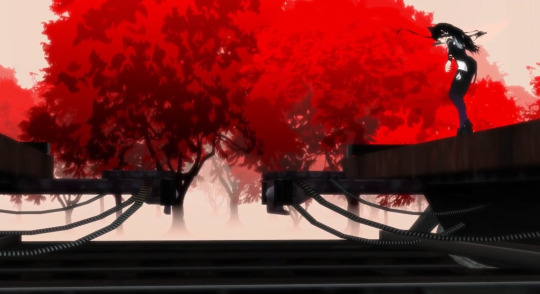
Blake chooses to save the lives of the crew members and distance herself completely from the man who only seeks harm rather than change. This is her defining trailer moment; she does what’s right even if it’s hard for her. Cutting herself off from Adam exposes her to his wrath, to life without the White Fang, to life alone. But it’s the right thing to do, and so she does it.
CHAPTER 5: YANG “YELLOW” XIAO LONG
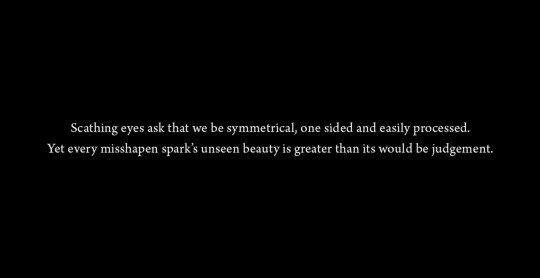
Yang’s trailer (my favourite one!) opens with a lengthy, wordy, and clumsy quote that makes little sense for her character until we get to volume 4 onwards. Something about strength, willpower, or determination would probably make a bit more sense than heavy handed foreshadowing.
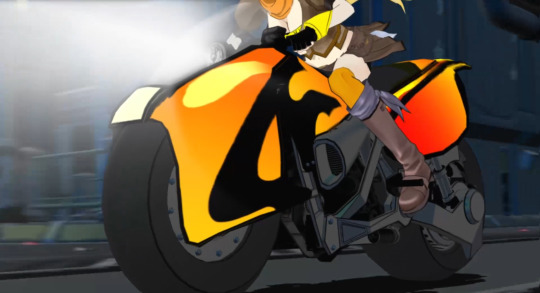
She literally rides in with a motorcycle as her introduction and is on her way to kick major ass.
Yang’s introduction is simple and effective; she’s cool, you’re not, get over it.
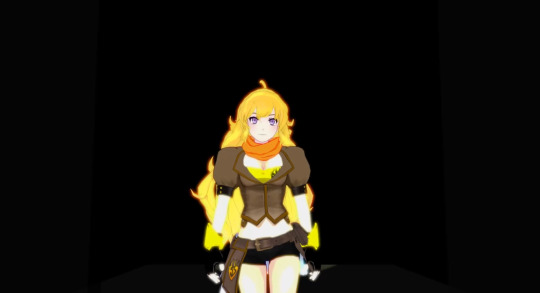
Everything about her conveys confidence. The swagger in her strut, the comparison to a rising sun (while all other characters are framed against a moon, mind you), even the easy smile she’s got on this entire time. You already know she’s going to be bright, confident, probably carefree and all kinds of reckless fun to offset the other members of RWBY.
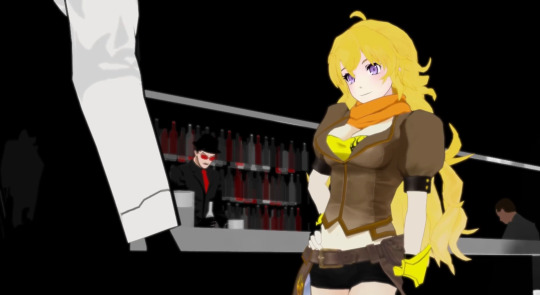
“Aren’t you a little old to have a name like Junior?”
Yang has an advantage in her trailer to the other characters in that she openly interacts with someone for more than two seconds. All her interactions with Junior make it clear she has very little respect for those with “power” over her; she waltzes right into his club and demands things from him and he’s (creepily) smitten with her the entire time; and she just uses that to bait him into a punch for being a creep.
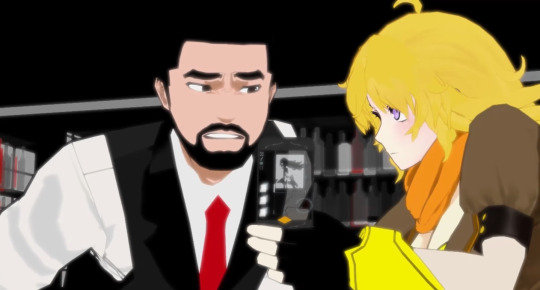
Yang’s search for Raven being in her trailer helps it not feel out of place when you look back, but does keep me wondering how Yang didn’t recognize her by the armour and sword she uses.
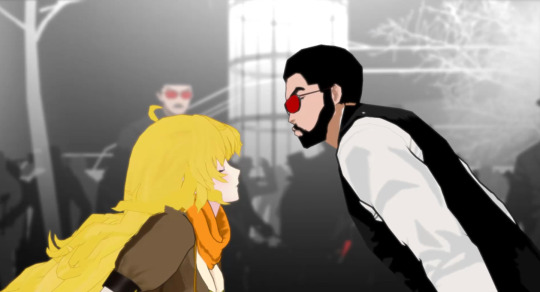
Top ten pictures taken moments before disaster. It’s what he deserves! Yang’s trailer just exudes fun, confidence, and doesn’t sacrifice her strength to get either. She knows what she wants, and she also doesn’t take kindly to creepy men flirting with her. (Remember when she punches Shay D Mann in Volume 4? Yes I name dropped him specifically so more people would see his name.)
Regardless, this is definitely her defining moment! Yang is quicker than she looks, and she doesn’t appreciate getting creeped on, and she’s gonna teach him a lesson for it. Ever wondered why she walked into a random club and started beating people up?
A basic interpretation of her character would say its because she never got what she wanted; answers on Raven. Anyone with two braincells to rub together can tell you she only starts kicking ass when Junior calls someone underage “sweetheart”, and then actually takes her offer to kiss and make up seriously despite her whole... being underage. Yang takes shit from nobody.
Frankly, it does keep me wondering why Yang always looks so passive when Blake gets insulted in later volumes, but we’ll get to those when we get to them.
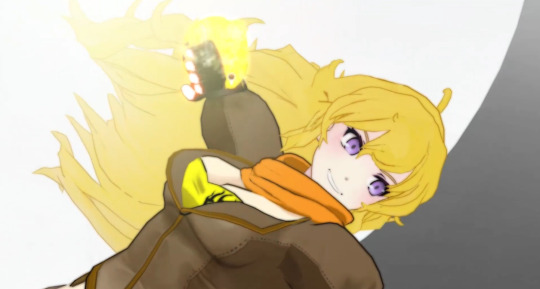
Oh, look, a RWBY character framed against the “moon” in their trailer!
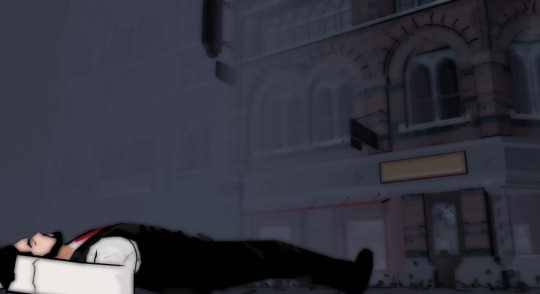
The rest of the trailer is just Yang kicking ass in typical Yang fashion, with the added quirk of her anger when you touch her hair. Cute tertiary traits like that can be cute on characters provided.
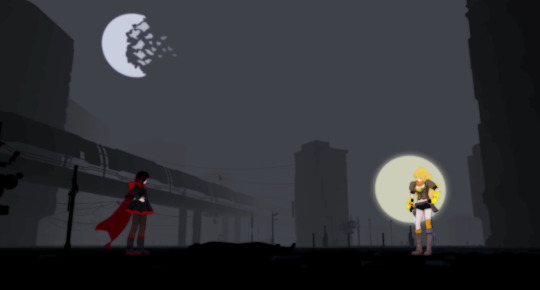
Pretty shot! Also the reveal of them being sisters. Not much else, though; most of Yang’s character is shown by her reckless approach, carefree attitude, and her strength that doesn’t come at the cost of her being edgy and brooding. My favourite trailer to watch, to be honest.
CHAPTER 6: CONCLUSION
The trailers for RWBY work so well because they took the opportunity to show off each character individually. The show didn’t promise exciting stories of Salem and Ozpin. The show never promised an exciting world brimming with spinoffs, fanfiction material, and original character fuel.
The show took its trailers and designated them to the CHARACTERS. Because RWBY wants you to look at its characters first and everything else can wait. The reason the Red trailer is my least favourite isn’t because I hate Ruby (I love Ruby!); it’s because it’s Ruby impassively beating up Grimm after visiting her dead mum. Cool premise, but it offers nothing to her character before telling you she has a dead mum. Blake and Weiss’ trailers show us important events in their lives; Weiss’ trial to go to Beacon, and Blake’s decision to leave Adam and the White Fang; her decision to trade comfort for what was right. Yang’s trailer is just dripping with character and is fun! I’ll go ahead and tell you I think the best trailers are, in order, Weiss > Blake > Yang > Ruby.
So if anyone ever tells you the show only cares about its fights, they’re not watching what you’re watching. And if you think the plot matters more than the characters themselves, well... I think CRWBY might disagree. But who’s to say that for certain except them?
Either way, I hope you enjoyed the read. I’ve wanted to do RWBY analysis for so long - the actual kind rather than any analysis that pretends Adam was ever anything but a device for Blake and Yang or acts like that’s somehow bad, or the FORCED PANDERING.
The next time you hopefully see me, I’ll be talking all about Volume 1 in a post probably just as big as this one. Volume 1 is a wonderful start to the series, endearing in its trial by fire, and I hope to see you then. For the record, it’ll be much less of a screencap -> analysis format as I won’t be going episode by episode, instead talking about the volume as a whole along with standout episodes, moments, characters, and things that didn’t sit right with me. That was just for the trailers! Liveblogger I am not.
12 notes
·
View notes
Text
RWBY Rewrite: The Schnee Family
Hello there everybody! Welcome to the third post in this undetermined number of RWBY Rewrites posts because at this point anyone who is watching RWBY for the story clearly needs to get their head checked. I debated the topic for this one for a while and have now settled on getting to one of our most prominent families in Remnant: the Schnees.
Being the ones in charge of the Schnee Dust Company, which supplies the majority of Remnant’s Dust, as well as being Weiss’ family, it makes sense that the show would give them focus. Unfortunately, the Schnee family as well as many other elements in the show have fallen victim to the time crunch of the writers juggling too many things at a time. It’s honestly a miracle that Weiss’ character is written as well as it is. In fact, it is the best written of the four girls (though not without its issues) and part of that is due to her collection of songs. Though in my opinion, you could argue that the soundtrack does a better job of telling the story than the actual show.
In this post, I’m going to be going over Weiss’ immediate family as well as her grandfather. As of now, I’ve been thinking of rewriting RWBY in five main arcs: Vale, Mistral, Atlas, Vacuo, and the Final Showdown. The family would be set up in the first two arcs with them getting most of their conclusions in the Atlas Arc, mostly regulated to cameos or mentioned in passing afterwards.
Nicholas Schnee
The founder of the Schnee Dust Company, outside of that WOR video, we honestly don’t know much about him and that makes sense considering that Nicholas most likely died before the beginning of the series. Considering my Rewrite series would throw out those videos, I would keep Nicholas regulated to mentions of Schnee Dust Company past and potential flashbacks in Atlas.
However, I would add one thing to his characterization that I think would tie into Weiss’ journey pretty well. Weiss, especially at the beginning of the series, strives for perfection in all that she does. Above all, she definitely looks up to her grandfather’s example. During a time in Atlas when she’s at her lowest, with her father’s icy words piercing her mind, the hateful looks of the Faunus directed at her, she despairs at ever living up to her grandfather’s legacy. Only to talk with someone (currently I’m thinking Professor Polendina) who personally knew her grandfather who would tell her that Nicholas was by no means perfect. He was a very warm, good hearted, jolly man, but he would occasionally let out a rather racist remark and had a rather explosive temper. Contrary to the SDC image, he wasn’t a saint. That said, his views were actually pretty progressive for his day in terms of his business practices and his treatment towards the Faunus. Ultimately, Weiss would learn that while her grandfather was by no means perfect, he never stopped trying to better himself.
Jacques Schnee
You know, I have to give credit where credit is due: Jacques is actually pretty well written. Okay, he’s not the pinnacle of how to write an parental antagonist, but his role in the story and his at least emotionally abusive relationship with Weiss is actually pretty well done. It helps that he’s not completely talk, his actions also do reflect on this such as cutting Weiss off, forcibly carting her home after the fall of Beacon, his grip on Weiss at the party as well as his smacking of her afterwards, and even disinheriting her and keeping her under house arrest until she gives into his demands. Yet above all, he is a cut throat businessman who will use anything to benefit him. It’s a good example of how just because someone in a story is not a good person does not necessarily mean that they are a bad character.
Honestly, the most I’d change with him is make it more apparent in the show of how he uses everyone beneath him for his benefit (going back to the Atlas Corruption theme I had last post). Show people protesting outside SDC Headquarters or better yet show the dust mines and how dangerous they are to the workers especially without the necessary safety measures which Jacques is cutting back on in order to make as much profit as possible.
Another change I would make is in the Atlas Arc is that Jacques tries to get Weiss back under his thumb, but can’t. By this point, Weiss would be legally an adult and therefore can’t be forced into anything. In fact, his disinheriting her ironically freed her as there’s nothing he can hold over her to make her fall back in line. His part of the plot would culminate in Jacques being in mortal peril, left alone by everyone (even Whitley, his favorite child) to die only for Weiss to step in. It would end with Weiss saving his life, but not saving him from the law and jail. He needs to pay for his crimes, not just his actions against her.
Winter Schnee
Much like Jacques, I don’t think Winter was written all that badly. I guess the only complaint is that I wish we could have gotten more mentions to their relationship before Volume 3. Personally, I also would have liked her to have been at the Argus base inspecting Cordovin and briefing her on the situation in Atlas, only to run into her sister and her friends and therefore avoiding one of the most poorly thought out plans in the show.
In this Rewrite, I would have Winter shoulder more responsibility in leadership and rise to the occasion. In regards to that, I would also have Qrow apologize for his actions to her. Much like Weiss has to prove her resolve to others, Winter eventually gets Qrow to realize he’s been judging her by associations and not her as an actual person. On the flipside, Winter would realize that Qrow’s problems and concerns with Ironwood aren’t entirely unfounded.
In the ending of the Atlas Arc, Ironwood will resign his positions as General and Headmaster, as will many others due to an inquiry of the Atlesian military as the deep routed corruption is being brought to task. And given his abuse of power, his council positions would be separated so as to prevent this situation from repeating. This, along with other events, would go to show that our heroes’ actions have consequences, for better or for worse. Ironwood’s general position would pass to a Rudolph Vermillion, a male reindeer Faunus who after the inquiry would be the person with the most military experience with a clean record(and partially for diversity) that the group would be interreacting with during the Atlas Arc. His headmaster title, however, would go to Winter as I feel she would actually do well in a teaching environment. And let’s face it, we only had three women in positions of power in the show: Glynda was treated as the clean up maid, Sienna got stabbed, and Cordovin is definitely not what I would call leadership material. Winter would continue to a pillar of support and offer the group her well wishes (as well as threaten Qrow to make sure her sister comes back in one piece.
Willow Schnee
I think that her name hasn’t been confirmed in the show, but I like it and I need something to call her so I will address Mama Schnee as Willow.
You know, I’m not really fond of the dead parent cliché, but this is one case that I honestly wouldn’t have minded if they had killed her off. She had never been mentioned prior to Volume 4 (much like my next entry) and with Winter seeming very parental in her treatment of Weiss, I’m pretty sure most of the FNDM assumed she was dead. Then it turned out that she was alive, with her making no physical appearance in the show and is basically made out to be an uncaring drunk. And such a thing wouldn’t necessarily be a bad idea if not for the fact that almost every mother in the show is either dead or terrible. We only have three good moms in the show and two thirds of them are a lesbian couple that was introduced after the halfway point last Volume.
Personally, I would keep her much more apparent in her children's lives. Being rather sad, maybe still have a little bit of too much alcohol from time to time, but make it clear that she does try to connect and be there for her children. This would lead to her kids viewing her in very different ways: Winter views her with scorn that she stays with Jacques while Whitley alters between ignoring her and seeking her comfort. Weiss would be the middle ground as she seeks to understand why Willow married Jacques and make her realize that she can leave him and there are people she can count on to help with that.
Which does lead to the reasons as to why Willow didn’t just divorce Jacques: half emotional abuse and half for her father and the company’s sake. As anyone who has been in an abusive relationship knows, it is very hard to leave when you get into it, especially if it feels like you don’t have anyone to help or support you. That is especially compounded when you consider that Jacques is the reason the SDC has managed to thrive and that a divorce of this kind might permanently damage the company. In fact, it would have been one of the main reasons she married Jacques and finding out how badly he took advantage of that power would be an utter shock to her. Her arc would be about her taking steps to get back to her old self and using her skills to aid others. She and Klein would watch over the company for Weiss (she never really had the skills or desire to take over the business, but realizes someone needs to watch over things for now) until she returns to take her place as the head of the SDC.
Whitley Schnee
If there is one character that has a significant divide in people’s opinion of them, it’s Whitley. Some people think of him as a potential victim of Jacques’ abuse while others think of him as a little shit. Personally, I lean towards the later as it seems Jacques does value Whitley (having a picture of him on his desk and none of his daughters and the family portrait has him smiling while everyone else looks very uncomfortable). Though to be honest, Jacques’ treatment of his children may be likely to get compliance to a degree, but unlikely to foster any genuine love and loyalty. So I get the impression that Whitley is not so much loyal to Jacques as loyal to his own interests and that is what I would play up.
Have him very much fall in line between Jacques in public and disparage his sisters, but show little hints of his true emotions when no one else is watching (either flashes of anger or impressed looks). A change I would have made in Volume 4 is him being there in the library as Weiss is leaving. Weiss would immediately assume he is there to stop her, but he is actually okay with her going. At this point, there’s no disadvantage to himself in letting her leave thus making him similar to Jacques in that he cares about his own interests first, but he’s not as controlling and is willing to let others do as they wish so long as they don’t interfere with his goals.
The Atlas Arc would involve him getting some snipes in at Weiss and her friends before getting a dose of reality in seeing exactly what a huntsman/huntress can do as well as watching the things he was sure would protect him fail and leave him vulnerable (like say, a White Fang assassination attempt). As such, he will abandon his father when things are at their most dire. After Weiss takes her heiress title back and takes over the company, that leaves the two with a very uncomfortable talk. Weiss does not like or trust her brother, but he is family and she would rather not have him as an enemy. So learning from her father’s strict control, she offers to pay for his education as well as a monthly stipend in exchange for signing a legal contract that he will not enter the SDC or join a competing dust company. Otherwise, he can do whatever he wants. There’s a bit of back and forth between the two of them ending with Whitley expressing genuine respect for his sister and wishing her well on her journey.
As for Klein, he is great as he is and I honestly wouldn’t change anything.
Those are my general thoughts on it. If you have anything to add, don’t hesitate to comment. Next time, I think I’ll be touching on a character that will be much more morally gray in this rewrite.
#rwde#rwby rewrite#jacques schnee#willow schnee#winter schnee#whitley schnee#nicholas schnee#guess you'll guess on the next one#klein sieben
19 notes
·
View notes
Note
I was talking over the V6 ending w my sister (who’s outside the fndm and has a belittling but honestly fair opinion of it) and she thought it would’ve been better if when Cordo got out the mecha, rwby&co refused to fight it and stood down. It would have been a break from routine (which I felt is why we had a huge fight) And then they get arrested, Qrow gets identified, and then they get brought into Atlas. It would have drama set up for V7 and our protags face consequences for their rashness.
YES. Tell your sister we’re on similar wavelengths! I’m gonna write out a possibility purely because I feel like it.
Jaune suggests stealing an airship. There’s immediate opposing views. The group is split on whether they should do this (with characters like Maria and Oscar being voices of reason). Ruby and Weiss are suddenly at odds because Weiss is not stealing from her military and Ruby is still hyper-focused on doing whatever she (supposedly) has to in order to get the job done. There’s actual representation of what happens when eight different people try to agree on one Very Important Thing. AKA, they don’t.
The “Let’s not” group goes along with it though because what else are they going to do? Abandon their family? No, not after the Fall, but there’s clear tension here, leading to a lot of mistakes along the way. Their plan doesn’t go smoothly at all---both because it was a stupid plan to begin with and because half the group isn’t invested---so they’ve got Cordovin on their tail soon after.
Ruby wants to fight. Maybe she does for a few minutes, giving the audience some of those cool shots and tricks. Maybe she gets hit with that canon. Then when forced to retreat she’s pulled aside and made to actually look at all this, someone like Weiss pointing out what the viewer has long been encouraged to realize about this situation: You are attacking and stealing from an ally, threatening the peace we’ve worked so hard for. You’re losing. The people are scared out of their minds. It’s going to attract grimm. We have no plan for getting out of this. Blake and Yang aren’t responding and we have no idea why. You’re not being a good leader.
Ruby finally realizes she’s made a terrible mistake. Jaune has not. He’s still obsessed with this plan, mostly because he’s fueled by the violent grief we saw aimed at Oscar. There’s conflict between the two leaders now, but it’s clear Jaune doesn’t have any more support. Ruby tries to surrender, but just then the grimm shows up.
Cue real remorse on her part, and the others, that they’ve caused this attack. Cordovin very reluctantly lets them fight because she knows they need all the help they can get. Because all those smaller grimm are doing actual damage. Some people are attacked/killed. Some property destroyed. It’s not a full on Fall, but there are definite consequences. Jaune finally looks like he’s been punched in the gut because his sister is out there. (They’re fine though I’m not killing the gays lol).
An epic fight ensues against the grimm. Ruby tries her silver eyes. She fails. There’s no magical do-over, setting up the need for her to practice and grow over a number of upcoming volumes (and eliminating the problem of “What danger is there now if Ruby can just freeze any grimm that comes their way?”) Cordovin and the others manage to take out the main grimm with her undamaged canon, demonstrating that these non-huntsmen defenders exist for a reason. At the end of it all Ruby gives her apology, but instead of randomly changing her tune Cordovin curtly thanks them for the help... then arrests them.
Shaken from their fight with Adam, Blake and Yang return to find they’re all being taken into custody. Everyone can immediately tell that something is wrong with them, especially since they freak out a bit at the sign of authorities, but looks are exchanged, conveying that this is something they’ll have to explain later. They wait while Qrow speaks with Cordovin, setting up their transfer into Ironwood’s hands. Oscar tells them about how Ozpin saved him from crashing the ship and everyone is dejected, realizing exactly how much trouble they caused and what so many people needed to do to keep them---and the civilians---safe. They’re still angry at Ozpin, but for now that’s overshadowed by everything else.
Maria lightens the mood a bit as they fly into Atlas a few hours later under guard, saying that they did technically achieve their goals. Just, you know, in the worst way possible. Whether through more dialogue or not the viewer understands what the group is grappling with now: not just how to achieve supposedly impossible missions, but how to do that in a manner befitting a huntsmen. Not much use saving the world if they end up destroying a good portion of it in the process.
Volume Five was, in some respects, a fairly joyous ending with a big win against the enemy and the group finally reuniting. Volume Six’s ending is a lost more somber, setting up the sort of moral, choice-driven writing we should expect from here on out. The world (the series) is a whole lot more complicated than the characters originally thought. Now they’ve got to figure out some way to navigate it.
#rwby#long post#mymetas#sometimes you've just got to chuck some changes out#for your own sanity LOL#lesbiannataliaromanova
41 notes
·
View notes
Text
RWBY Recaps: Volume 6 “Our Way” (The Finale!)

We made it, folks. Volume 6 is finally over and my god what a disappointment it turned out to be.
I’ve danced my whole life and I had an instructor once who gave a lecture on choreography, cautioning us that the order you put your pieces in is just as important as the pieces themselves. Though each comes together to create a whole, your audience is more likely to remember the first and the last piece—so make those two count. Volume 6 began strong with the relic and the lore, and then ended on a flat, uninspiring, illogical note. Sadly I know what part of the performance I’ll be remembering from here on out.
However, first let’s tackle what we didn’t get this episode. There was no flashback to Oscar at Argus, re-characterizing his outing as something significant that might actually impact his growth as a character. Rooster Teeth really just… did that. They gave us an exact repeat of episode four, had Jaune physically assault Oscar, no one stepped in, no one bothered to check if Oscar was okay, we set him up staring morosely at the door, a two week cliffhanger, and then we really got an episode all about Jaune’s emotions while Oscar bought new clothes and made these people a casserole. He immediately accepted an incomplete apology, went so far as to speak like he thinks he’s going to die… and the group just smiled at him. Because remember, right now they only care about outsiders—which Oscar still very much is—when they’re helping and not getting in the way. Which Oscar has now promised to do. The finale gives us a brief moment where Ruby tries to praise Oscar for his efforts and it just rang as incredibly hollow to me. It’s easy to be kind to people when everything is going your way. You show your true colors when things get tough. RWBYJNR has repeatedly demonstrated this volume that when push comes to shove they’re willing to throw Oscar (and Ozpin) under the bus.
I’d need an entire, separate recap to detail exactly how horrible their treatment of him has been and how worrying it is that the story continues to frame this behavior as not just acceptable, but the actions of heroes. Suffice to say, if you have friends who seem nice on the daily but use you as a punching bag whenever they need an outlet? Do me a favor and get far, far away from them.
In the interests of moving on, another thing we didn’t get was any mention of Raven. A few friends theorized that last volume’s end credits scene (where Tai spots Raven using his portal) might finally come into play, but no such luck. More importantly to my mind, Yang still hasn’t said anything about Raven being the Spring Maiden, so that continues to be a secret she keeps while heaping more judgement on Ozpin. We’ll get to that later.
We didn’t see that true reconciliation teased in the last shot of the opening. Ruby never fought grimm with arms like those, let alone in a sewer tunnel… even though one was right there at the farm. I’m honestly starting to believe what others are saying about whole episodes being cut to make time for GenLock. Something happened this volume because the writing took one hell of a nosedive. It’s not just that I don’t agree with the messages the show is expressing, it’s that we have dangling threads, confusing “twists,” and what honestly feels like half-assed storytelling. Like they knew they had to complete the volume but just weren’t feeling motivated, so they chucked together something shoddy and left it at that.
(We also didn’t get to hear what Ruby bought them all at the gift shop. I realize this is a comparatively tiny thing, but to my mind it was a missed opportunity. They could have bookended the premiere and the finale, revealed that tiny mystery, told us something about Ruby based on the gifts she chose—the fandom keeps complaining that she’s one-dimensional—and if she’d picked up something for Ozpin at the time, that would have been an easy moment to have the group start reflecting on their behavior, a reminder that just a few days ago he was an important member of their team. Obviously I doubt the gifts survived the train crash, but there’s no reason why Ruby couldn’t tell them about it; a quiet moment before they reach Atlas. Like the shorter season length though, this episode was short for a finale. We were barely given enough time for the plot, let alone any reflection.)
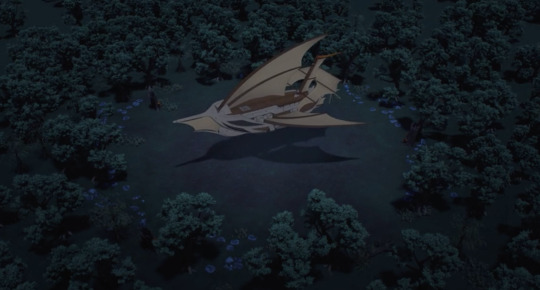
For now though, let’s dive into the actual episode. We open on a field where an airship lands, Neo transforming as she steps out. That really is a powerful semblance. She can create copies of herself, disguise herself, and (as we’ll see in just a moment), disguise a whole freaking airship too. Granted, that last one seems to take some effort, but as this finale will inform us later, it doesn’t really matter how tired you are. If the plot needs you to do a thing with your semblance, you’ll manage it. Somehow.
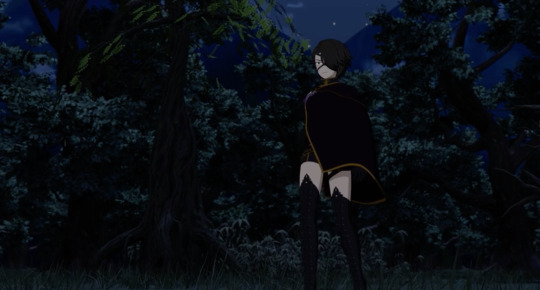
Cinder arrives in a new outfit as well and, like Neo’s, it’s pretty damn skimpy? I haven’t bothered to bring this up before because on the whole RT writes it’s mostly female cast very well, but considering how many other criticisms I’ve got today, why not chuck out one more. Meaning, why do these designs continually have to promote sexiness over practicality? Weiss, Nora, and Ruby all fight in skirts—hastily justified as “combat skirts”—and at least half the women on this show fight in heels. Yang sports short-shorts. Both she and Blake have bare midriffs. Now Neo is in a top that looks like it’s held up by a prayer and Cinder is sporting lingerie-like knee highs. There’s just no reason to design characters like this, especially when a good chunk of your cast is made up of teens. Cinder says herself that Neo will soon need snow boots. Just dress her appropriately for the weather from the start. You know, like how we didn’t get with Team RWBY while traveling through a kingdom filled with snow. Apparently Weiss wearing a scarf is enough to combat hypothermia for the whole team.
And yes, I realize costume changes require new models to be made, but that’s precisely why you should design your fighters as fighters from the start. You’re battling giant monsters? No one would wear heels. Or skirts. Or expose their midriff. It seems pretty convenient that aura supposedly protects them, eliminating the need for armor, and yet now it’s only our most masculine character—Jaune—who still bothers to wear it. Neo and Cinder are just the most recent examples of, “Why the hell would you wear that to a fight?”
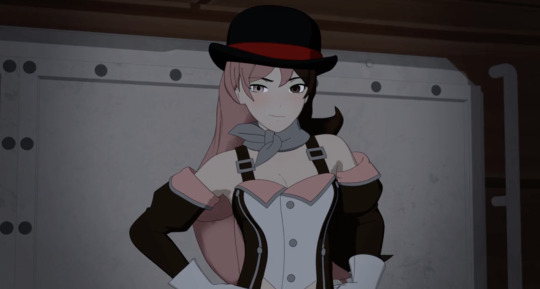
Well, maybe these two will freeze to death before they ever reach the group… They’re heading to Solitas too and though they didn’t do anything in this scene besides reveal new and impractical clothing, I was more interested in their brief discussion than I was in the entirety of RWBYJNR’s fight. At least I’m comfortable in how I feel about Neo and Cinder. They’re bad guys. They’re gonna do bad things that the story frames as bad. They’re usually fun to watch. I don’t get frustrated and confused whenever they come on screen nowadays.
Cinder says, “Someone once asked me if I believe in destiny…and I’m happy to say I still do” as we get a final shot of them planning their nefarious deeds. We’re getting a lot of references to Pyrrha this volume—this, the statue, Ruby’s memories later—and taken on its own that’s fantastic. In a season though where Pyrrha’s death is subtly ‘justifying’ the group’s awful behavior and acting as a reminder to the fandom for why they unjustly hate Ozpin? Ehh…
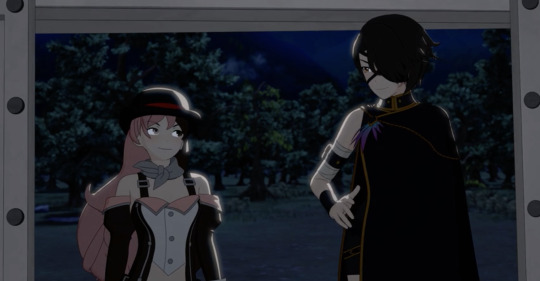
We close on the villains and open on our “heroes” with rousing music to signal the upcoming battle, which… isn’t really a battle at all. The Leviathan is steadily approaching Argus and the Atlas personnel are calling for Cordovin. She’s still stuck, yelling about how “This is your fault!”
And it is. However, once again Cordovin’s exaggerated attitude makes it easy to ignore the fact that she’s right. She’s racist! She’s arrogant! She’s screaming and sounds like a child! Clearly our group is the mature ones here. Look at how calmly Ruby faces her down in contrast… It reminds me of how people (particularly women) are told that they’re being “Too emotional” in this conversation and therefore all the points they’ve made are somehow invalid. Of course Cordovin is emotional. A group of kids just lied to her, stole from her, started a battle against her, and destroyed her mech right when her city is about to be overrun by grimm. I’d be screaming in frustration too.
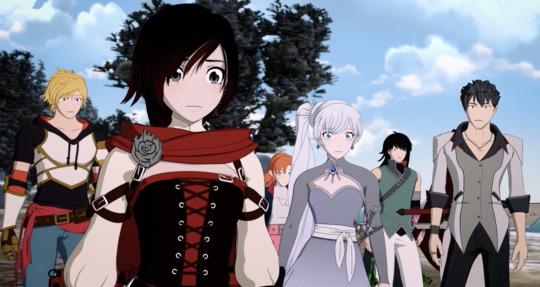
Though of course, most don’t view it that way. I agree with what others have pointed out, that if we’d been given a calmer authority figure saying the exact same things—No you can’t go into Atlas. Why would I let anyone other than Weiss cross a closed border?—it would have been easier to see exactly how horrible the group’s actions are here. As it is, Cordovin’s personality acts as a distraction. One more way to present the group as heroic when they’re anything but.
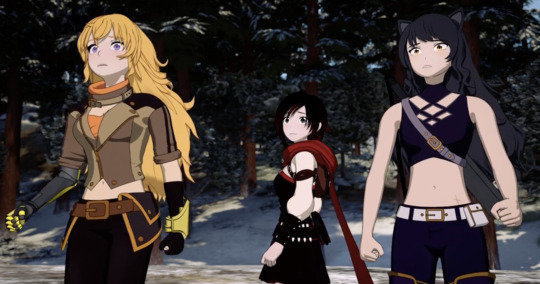
Yang and Blake arrive on the scene, wanting to know what the hell is going on. Yang asks, “Is that a giant grimm?” and Weiss responds, “Yes…and we just ruined the only thing capable of stopping it.”
That’s an admission of facts, not necessarily an admission of guilt. The group acknowledges that they ruined the one defense capable of taking out a grimm of that size, but as we’ll see, there’s no regret attached to doing that in the first place. It’s just summarizing the situation for Blake and Yang.
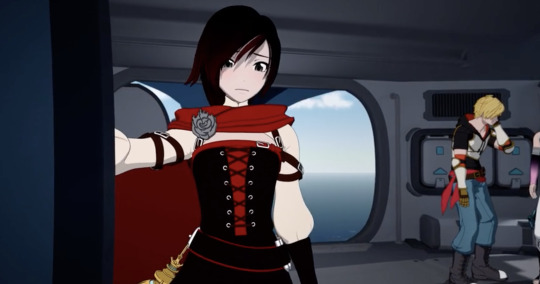
Granted, we get a moment where Ruby looks worried/potentially sad as they fly away from Cordovin, but what does that mean here? Is she sad about what she’s done? Or just worried about this new situation? Their actions have been so extreme that the story can’t afford to be vague about the characters’ emotions here. Plenty of people will (and are free) to read this moment as Ruby experiencing fierce regret at her choices the last few hours… but it’s just as easy to attribute her expressions to fear about the coming battle. I’m not inclined to give these characters the benefit of the doubt here. They haven’t earned it.
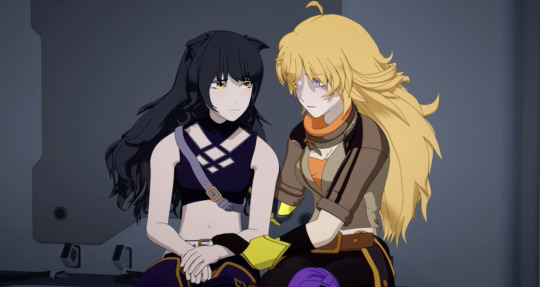
Regardless, we cut to the airship where apparently Yang and Blake have already told everyone about Adam. That was not the sort of thing that should have happened off screen. By all means, be practical. There’s no time for a long-winded conversation with the Leviathan bearing down on Argus, so have Yang announce that they’re okay, yes something happened, we’ll explain things later. Now you’ve established that this very important information will be conveyed either on the airship later, or at the beginning of volume 7.
What a waste. This is the end of a villain we’ve had since the Black Trailer—the first time our protagonists have killed a fellow human being—and that admission is regulated to the 30 seconds it takes to fly from Cordovin to the middle of the fight. Ruby hugs Blake and tells her she’s safe, but that’s it. That’s currently the extent of the team’s reaction to this huge revelation and like JNR learning about Salem, the audience has no idea what sort of details they received. Do they just know Adam died in the fight or that they deliberately killed him? Did Weiss hear about the brand? We don’t know. Hopefully this conversation is given more weight in volume 7, but given what else we’ve seen lately, I’m not counting on it.
Maria then interrupts with one of the most jaw-dropping lines of the episode: “I suppose I have to be the bad guy and say it, but getting the lamp to Atlas is still our top priority.”
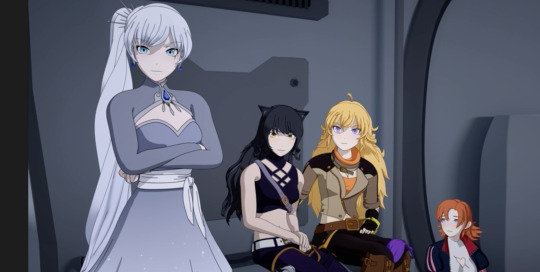
Are we for real right now? Where was this calm, level-headed, pragmatic Maria when she was pissing off Cordovin with cashews? Or cheering at Ruby rejecting all adults? Now she starts trying to think rationally? But of course, when she does stop her manic cackling it’s to suggest something horrific. Yes, Maria. It does make you a bad guy to want to abandon a city to the grimm you brought here. She realizes that everyone is dead if they leave, right? That without the mech or silver eyes Argus has no decent way of stopping that Leviathan? Maria is meant to be the Grimm Reaper, the greatest huntress of her generation, and the writers think it’s appropriate to not only have her encouraging a bunch of kids to recklessly commit treason, but then condemn a whole city to probable death for their mistakes?
No, the relic is not the top priority. The relic is a side mission. The top priority has always and will always be protecting humanity. At least Yang, Blake, and Weiss realize this. They say firmly that they’re not leaving and Ruby gives a little shrug like, ‘Guess we’re not leaving then.’
(They really like having Ruby treat her mistakes as jokes, don’t they?)
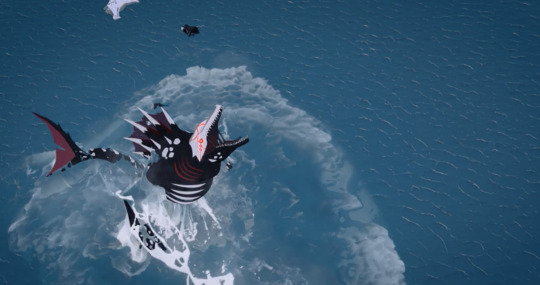
So Ruby announces she has an idea, the one the whole fandom saw coming a mile away, and the next second Qrow says, “Eyes up, everybody” because they’ve reached the Leviathan. Ha. Get it? Eyes up?
Okay. I’m done lol.
We get shots of the terrified Argus population, including Terra and Saphron.
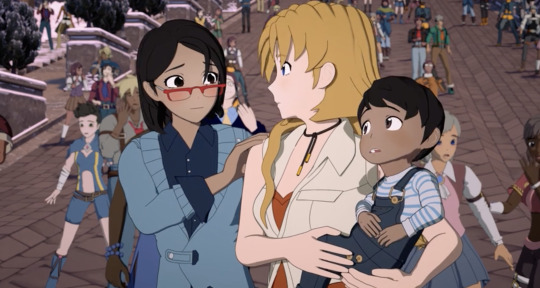
Ruby asks Ren and Jaune to mask the ship which, reminder, they shouldn’t be able to do. Ren maybe, but Jaune just used all his aura to protect himself and Nora from getting splattered by Cordovin’s arm. Then he was thrown into a boulder for good measure. Last episode he couldn’t even stand without hanging off of his teammates. Now we get exactly what I was afraid we would: the plot needs someone to Do A Thing so aura burnout is conveniently forgotten. Jaune gives a confident smile. Of course he can boost Ren’s semblance and cover an entire airship!
Keep in mind that we just saw Neo dropping in exhaustion after a second of using her semblance on a whole ship. Granted, her ship is bigger, but she’s also presumably at full strength right now. If we were bothering to follow the rules established by this world, I highly doubt Jaune would have been able to pull this off.
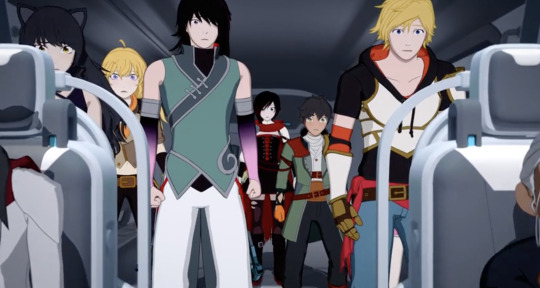
Meanwhile the Leviathan has easily taken out Argus’s first barrier. “It tore straight through…” Oscar whispers, reminding me that he hasn’t had many encounters with grimm. If I remember correctly he mentioned to Ruby that there was an occasional one on the farm (as expected), but they must have been pretty weak if an untrained kid can take them out with farm equipment. Oscar then goes straight to Haven, battles people at the Academy, gets on that train where he fought some manticores, but then he didn’t get to see the Apathy for himself. This seems to be one of the first times Oscar is seeing grimm at all, let alone one this deadly. No wonder he sounds shocked.
With the shield destroyed in an instant the Atlas personnel start giving the order to evacuate… when Ruby interrupts them. No worries, fine people. I have a plan! Wait, why should we trust you? “I’m a huntress.”
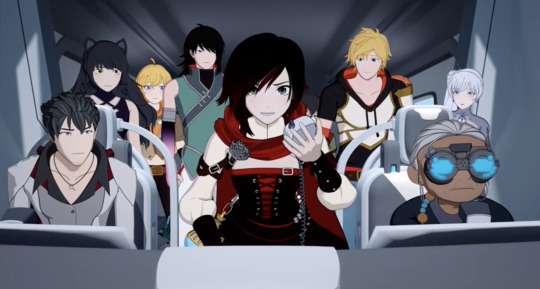
No you’re not, Ruby. Literally and symbolically, you are not currently a huntress. Ignoring for a moment all the stunts you just pulled, undermining everything a huntress is meant to uphold, that is a formal position. It’s a title that embodies great power in this world and you achieve that title by studying four years and graduating from an academy. You don’t get to call yourself a college graduate because you did one year and then studied on your own. Same with being a doctor, or a lawyer, or literally any titled position. Ruby (in continuing with the theme of this volume) is lying to that Atlesian soldier. She’s misrepresenting herself, claiming she’s something other than what she actually is: a half-trained teen with a current chip on her shoulder.
This is also another moment where she ignores Qrow when he yells for her to stop. The issue isn’t about who’s right here—whether Ruby should tell the others about her plan or not—but that Ruby is consistently ignoring everyone around her to charge forward with whatever plan she personally thinks is best. Qrow told her not to attack the Atlas military… look what happened. Qrow told her not to go stare down Cordovin’s missiles and try to make an impossible shot… look what happened. Qrow told her not to stubbornly stand her ground against a mech when the rest of her team is beaten and exhausted, and though Ruby survives, it’s only by the will of Plot Armor. She leapt into a freaking cannon. She knocked herself out. You’d think after all this Ruby would at least pause a moment to give Qrow the time of day.
It ultimately doesn’t matter though because their ship is still flagged as hostile. Atlas isn’t going to help them on what clearly looks like a suicide mission. We get a close up of Ruby daring to do what no one else can or will. “Fine… we’ll do it alone if we have to.”
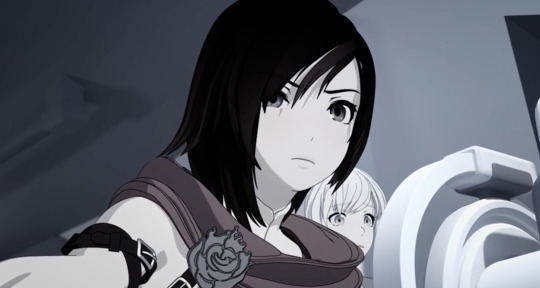
…which is precisely the problem. Atlas backing off might feel like a consequence—Oh no! Their actions lost them their backup!—but all it does is get the extras out of the way (who just happen to be adults) so we can more easily focus on the protagonists (who just happen to be teens). It’s a reward. They don’t actually need the airships here, as the group is about to demonstrate, so this ‘consequence’ is absolutely meaningless. It would be something entirely different if, say, the story actually framed the soldiers as necessary to distract the Leviathan and Ruby had to admit her faults, begging them to help despite her mistakes; if the story made it clear that teamwork was a necessity. But there’s nothing like that. This is meant to read as the hero’s crowning moment.
Also, as an aside, why in the world would Ruby tell them to wait on the rest of their evacuation? What if—a wild thought here—something went wrong? Like literally every plan you’ve ever come up with? Isn’t it better to get people to safety while you try out your idea, just in case it all falls to pieces? This is just one more moment of Ruby’s overconfidence putting others at risk. She’s endangered her team, herself, and an entire city this volume… and has learned precisely nothing from it.
But we’ll come to that. Right now Ren masks the airship’s approach, conveniently keeping it up just long enough for them to reach the Leviathan, and then he’s out. They still didn’t make it in time though. The Leviathan sends out another stream of fire that takes out the second shield and hits the top of a tower in Argus. Needing to get closer, Yang and Nora distract the Leviathan while Ruby rides in on one of Weiss’ summoned lancers. I did appreciate Blake briefly supporting Weiss as she works to keep her semblance up. Whatever else, this volume has been good about brief, non-partner interactions.
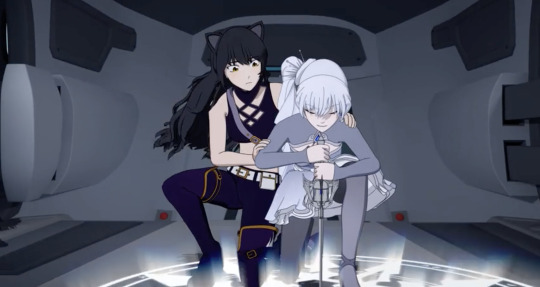
We hear Ruby encouraging herself as she flies in and then she chucks her communicator into the water to concentrate. I thought something would come of that? Why bother having Yang interrupt her if there wasn’t a serious issue (it takes another long moment for the Leviathan to turn on Ruby) and why full on get rid of the communicator if that choice wasn’t going to come into play later? Eh, whatever. Far from the first time we’ve had setups that go absolutely nowhere. This volume is full of them.
So Ruby does as Maria taught her: cycling through memories of her family and friends, trying to drum up that fierce desire to protect them.
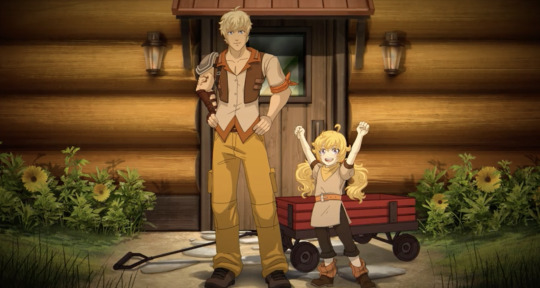
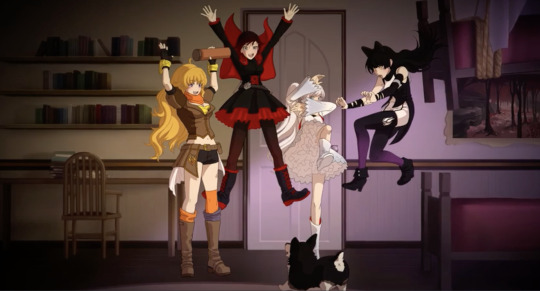
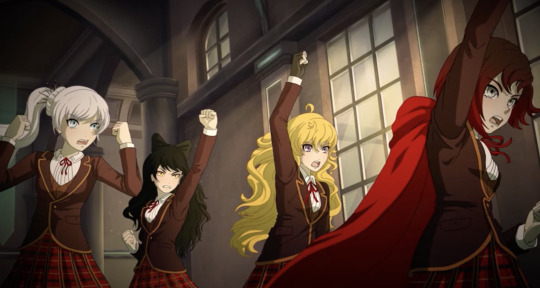
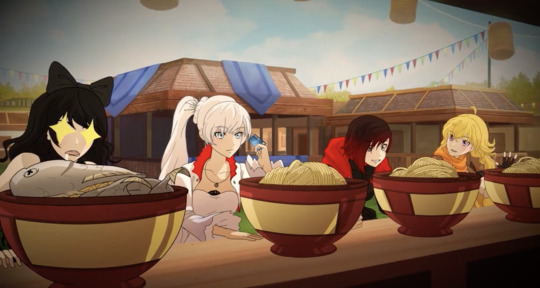
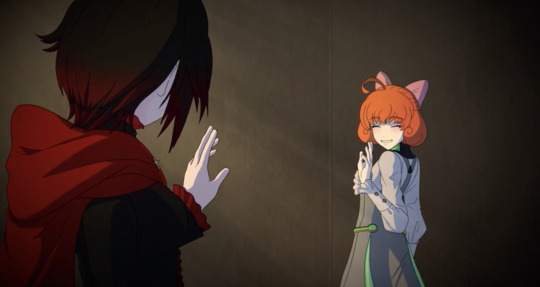
I did appreciate that Oscar, Qrow, and Maria get brief appearances… but again, the one team member who isn’t shown is Ozpin. Apparently Ruby now hates him to the point where he’s not even a part of her very generalized thoughts about who she wants to protect. I mean she met Maria three days ago and the woman now means more to her, apparently.
(For the record, I say this because Ruby knew Ozpin primarily in his headmaster form and is drawing largely from volume 1-3 material. We might have seen him in the new engine, easily. The shot of Oscar we’re given is also the one from the training room where Ozpin didn’t speak until Ruby left. Alongside Ozpin’s absence this volume, that’s the closest we’ve ever seen Oscar as only Oscar. That choice says a lot in my opinion.)
Eventually Ruby’s memories start to segue into darker thoughts and… okay. I’m confused now. Why is thinking about bad memories the thing that doesn’t let the silver eyes work? Not only were those moments where fierce protection would be at its strongest, but Ruby has only ever been in horrible situations when her eyes went off: Watching Pyrrha die, watching Jaune about to be killed, watching Blake about to kick it via Apathy. You’re telling me that during those times Ruby somehow thought about bright and happy things, not the horror of the fact that her friends were in the process of being murdered? If anything, those flashes of Yang without her arm or Penny cut into pieces should be the very thing that does set her eyes off.
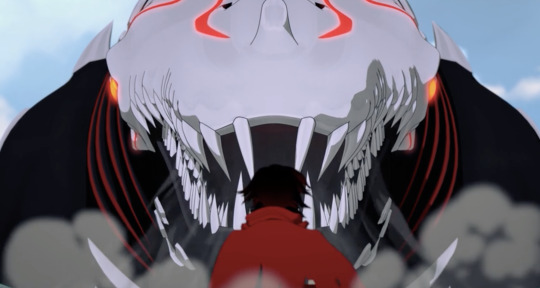
Instead they fail. Ruby opens her eyes to find the Leviathan turning her way and then, as a friend of mine pointed out, she gasps out a “What?” and looks down at the relic.
No. That relic has very conveniently done nothing the entire time the group was trekking through the woods, staying at an abandoned farm, driving who knows how far, and running around a new city. You’re not going to tell me now that suddenly it’s the cause of the Leviathan turning away from people currently attacking it. Either the relic’s draw is strong enough that Oscar should have been in trouble on the train, or it’s not strong enough to act as a justification here. The relic is the new Qrow’s semblance: turning off and on when the story wills it.
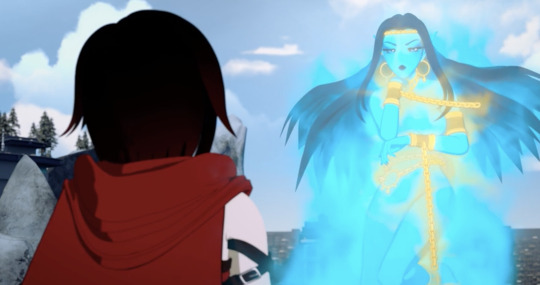
In a panic Ruby yells for Jinn, which is less the “clever” choice Jinn says it is and more a potentially clever gamble. The last time they used Jinn every creature in her vicinity remained active. Granted, all those creatures were human or faunus then, but Ruby wouldn’t know if she would freeze the grimm as well. Regardless, her gamble pays off (because of course it does) and we get another example of how the protagonists are currently super special people who can never do any wrong.
Jinn: “You do not seek knowledge, but just this once I will give it freely…I will not allow you to use me without a question again.”
Why? That’s the question you have to ask for all your characters’ decision. Why are they doing this? What’s their motivation? Jinn provides none. She has no reason to let Ruby off the hook for summoning her without a question, especially since she frames that as another bad choice that she’ll (somehow?) punish Ruby for if she does it again. But this time, once again, our protagonist is let off the hook, purely because she’s the protagonist.
With this very generous second chance Ruby re-shuts her eyes, thinks only of the good times, including a memory of Summer Rose. The fandom has been waiting a long time to see her outside of a covered photograph.
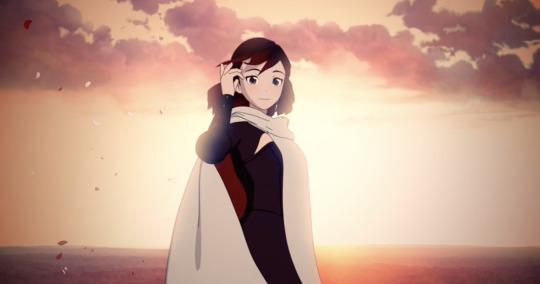
Ruby manages to activate her silver eyes. It works—mostly.
I mentioned previously how the show needs to introduce some downside to the silver eyes so that Ruby isn’t suddenly over powered against every grimm from here on out. This is a downside… but an odd one. The grimm turned to stone, but not all the way? Sort of just a stone encasing that it partly manages to break out of? Okay. I mean that works, but it’s a pretty easy downside to overcome. The grimm is still stopped in its tracks, giving the others plenty of time to take it out.
And, as always, pay attention to how it’s all framed. Despite not working exactly as she intended, this is meant to be a moment of victory for Ruby. She’s succeeded in her trial by fire. She’s single-handedly saved all of Argus. The music is rising, the people are cheering, people who have no idea what silver eyes are and will now start up legends about this girl. Who was the huntress with the magic-like power none of us understand? Ruby Rose. The girl who stood toe-to-toe against a Leviathan grimm and won.
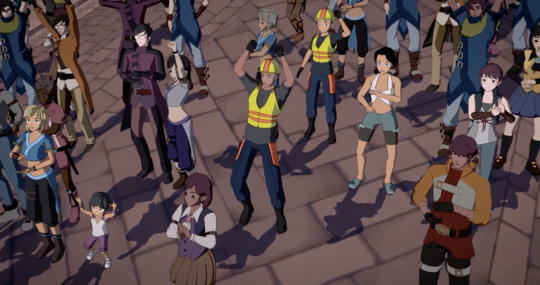
This would indeed be a wonderful moment if it weren’t Ruby’s fault the grimm was there in the first place. Like her own claims of “I’m a huntress,” this moment misrepresents Ruby to the people. No one is going to learn that she’s the one who endangered them, only that she’s the one who came to the rescue. She’s fixing her own mistake and then allowing that to stand as a heroic act.
I was so looking forward to Ruby learning to wield her silver eyes. Not like this though.
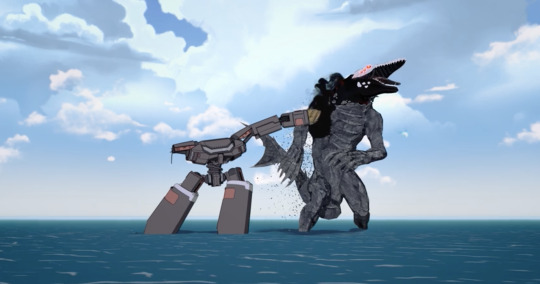
Cordovin arrives with her pinned arm gone, ready to finish taking out the Leviathan, and she’s suddenly stupidly cheerful about it. Again, characters need motivations. If their outlook on a situation changes we need to see why that happened, especially when moving from such extremes. In a matter of minutes Cordovin went from shrieking at the group to not just sunnily helping them—which is a practical consideration. As she herself says, “I was sworn to protect the people”—but also letting them go.
….there is no reason to let them go. None. It goes against Cordovin’s entire characterization, the logic of the situation, and nothing has happened in the last few minutes to change her mind. This is the story at its laziest: “We don’t have a reason for Cordovin to let them go. She’s just gonna. Because they’re heroes.”
During this conversation we get an “I’m sorry” from Ruby and that’s admittedly something, but like Weiss’ comment about destroying the mech or Ruby’s worried looks, what is she apologizing for? Because she doesn’t seem very contrite right now. The framing isn’t telling us Ruby has anything to be ashamed of. She’s the star in this moment. So that ‘I’m sorry’ feels less like an admission of wrong doing and more, ‘I’m sorry I had to attack you and that it almost got everyone killed. But I absolutely had to. No doubt. So I guess I’m only sorry that fate screwed us over. It’s not like I had a hand in this mess or anything.’
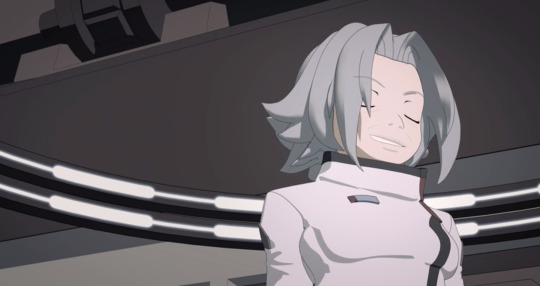
All of which is to say: there are no consequences. None. Zip. Nada. No one in Argus died (despite the fact that all those flying grimm apparently bypassed the mass of terrified people to go battle with the airships on the opposite side of the Leviathan??), no one was arrested, no Ironwood or Winter, no Ozpin coming to their rescue, no problems with aura, the mech still manages to fight, the airship still manages to fly, no one was even reprimanded for their behavior. This volume we have seen the group betray a man they were demanding trust from, steal a secret they knew nothing about, force him to relive thousands of years of trauma while taking in the personal history that was never theirs to see, verbally and physically assault him to the point where he has to remove himself from their presence, they repeat that on an innocent kid days later, do absolutely nothing to make up for that, show no remorse for their actions, steal military property, plotted to mess with one of the few remaining relay towers the whole world depends on, beat up Atlas personnel, chucked them out of a plane, started and continued a fight with a special operative that endangered an entire city of people, destroyed a city’s primary defense, risked straining kingdom relations, nearly got friends killed with these foolish stunts ….and nothing. Not a single consequence, punishment, or reprimand. RT set up a situation where the group makes horrific mistakes and then had them learn nothing from them. Far from it. They’re rewarded, telling the audience that provided you have power—be it physical strength, access to resources, or the knowledge of a super secret mission—you can do whatever you want. There is no single stupid, illegal, dangerous, or callous thing you can do that isn’t ‘justified’ with, “Well I literally could do it, so I guess that means I’m allowed to do it, right?” Our title, “Our Way,” definitely embodies the morals we’re given this season.
I’m honestly disgusted with this volume. Just as a piece of media. This isn’t a story where we’re following anti-heroes and are well aware that they’re committing horrible deeds. This is a story about traditional heroes who are now using anti-hero means, something the story has just straight up ignored. I really didn’t think RT would take things this far… but here we are. This is apparently our group now and I personally think they’re awful.
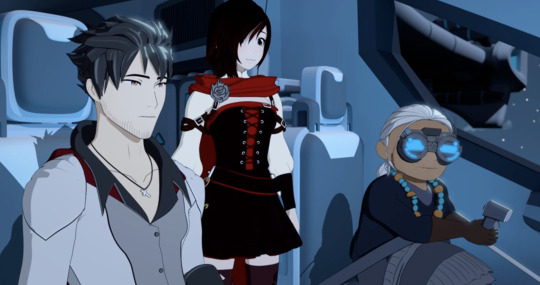
And ugh, there’s still more of this episode. We cut to the group flying that night and Maria comments that “We should have just enough fuel to make it.” Wow you… literally didn’t think anything through, huh? No one even bothered to find out if they’d have enough fuel to not crash land in the ocean halfway there. Wonderful.
We get another entirely illogical conversation between Qrow and Ruby. He tells her she, “Did good out there today, kid” despite the fact that Qrow was consistently (and correctly) trying to get her to not do the things she was doing. Is it too much to ask for Qrow to have a firm and honest conversation about her making reckless decisions instead of more unearned platitudes? And then Qrow lowers his bottle which… what? Alcoholism doesn’t work like that. Much more importantly, no one has tackled his drinking this season. Or the reasons he was drinking in the first place. Literally, Qrow’s semblance, his place in the war, Ozpin’s secret, none of it has been addressed. He has no reason to suddenly put aside his flask like he’s actually learned something. Does RT think we’re going to just imagine scenes that never actually happened?
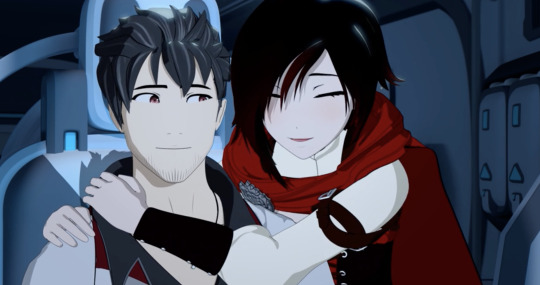
(I mean, that’s what fic is for, but that’s… fic. The canon should at least be attempting to hit a higher bar. This is their job, not an unpaid hobby done late at night when you’re exhausted after your own full day of work.)
Qrow and Maria also have a conversation about how he was there to “Catch them when they fell. Literally, if I recall,” implying, again, something that didn’t happen. Yes, Qrow literally caught Ruby when she fell from the cannon, but that line is meant primarily in the metaphorical sense: You were there to support them, keep them from doing something stupid, steering them back to the right path, etc. That’s what Qrow tried to do, but Ruby consistently ignored him.
This is all such a mess. Though we do get some nice shots of Blake and Yang sitting together—lots of hand-holding now—and Weiss comments that she’s glad Yang was there for Blake. Yang corrects that they were there for each other, confirming the lesson they learned off screen at some point.
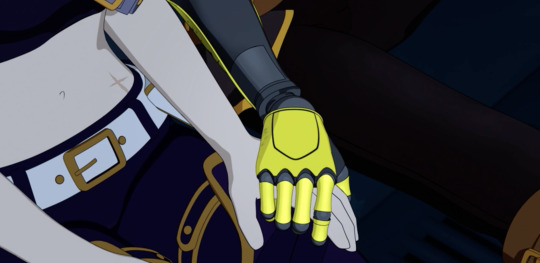
A conversation starts up once again painting Ruby’s recklessness as awesome heroics. Among her clique she’s all bashful now, no more arrogance when there aren’t outsiders to push back against, and Ruby tries to foster attention off on Oscar. He corrects them about landing the airship… he didn’t actually do that himself.
Oscar: “I didn’t land the ship on my own.”
We get a flashback to him panicking as the ship crashes, but this time we hear Ozpin saying, “Stay calm. It’s going to be okay.” Back in the present Nora immediately freaks out, “He took control?!” and Oscar corrects her with no, he helped guide me.
Let’s unpack this a bit. First of all Ozpin would have been 100% justified in taking control, just like he was justified in taking control at Haven when Oscar was going to get them killed by stubbornly insisting that he fight Hazel. Like everything else in this volume, each situation has its own context. Just saying, “Ozpin took control of Oscar without permission” sounds bad, until you bother to acknowledge that dying is kinda worse. It’s like if I see a 14yo boy running towards a road an I yank him backwards. Technically I just took away his agency—I haven’t allowed him to keep running forward when he wanted to—but I did it so he wouldn’t get hit by that car. If Ozpin had taken control to keep three team members, including everyone’s precious leader, from dying a horrible death via airship crash… that’s a good thing.
But he didn’t. Even now, even after everything, Ozpin is so careful to give people as much choice as he can. He assessed the situation and decided that he could guide Oscar without taking away the use of his body, the sort of consideration most people wouldn’t even bother with during a time of crisis. And think about those lines. “Stay calm. It’s going to be okay.” The last time Oscar spoke to Ozpin he was forcefully stealing the means to allow the rest of the group to betray him. Now here Ozpin is, not angry, just endlessly reassuring.
Then he leaves again. Everyone realizes Ozpin is still doing his best to give everyone what they supposedly want, right? I mentioned ages back that the group wants a contradiction, to have Ozpin fix their problems without having to deal with Ozpin as a person, and now he’s managed that. He comes in, saves their lives, then leaves so no one has to deal with the apparent horror of speaking to him. His level of selflessness is off the charts and it astounds me that anyone thinks this man is a cruel, manipulative puppet master.
…and then there’s Yang.
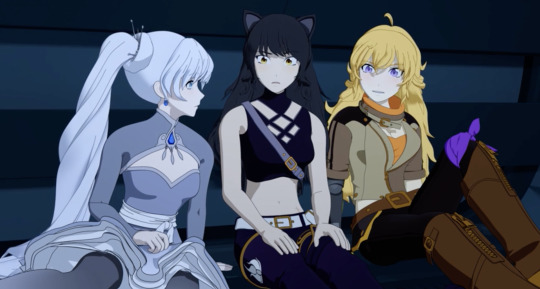
Yang: “Does that mean he’s been watching us this whole time?!”
Oh yeah. I don’t like Yang much nowadays. I forgot because the last couple of episodes the show isolated Yang with Blake. She’s good with Blake because she actually likes Blake and is probably in love with her. But put Yang with someone who isn’t willing to enable her misplaced anger (Maria, Ozpin) and suddenly she’s not a very kind person anymore. Like the rest of the group right now, Yang’s basic, human empathy doesn’t extend beyond the confines of their team.
Plus, what does that accusation even mean? She makes him sound like some sort of peeping tom and not the leader she was following three days ago. Yang realizes, right, that Ozpin isn’t allowed a body of his own? That he’s connected to Oscar? That anything Oscar sees Ozpin automatically sees too? There were admittedly questions about whether Ozpin was connected to the outside world while locked that deep in Oscar’s head, but Yang makes it sound like he physically left and then started stalking the group without their permission. She makes him sound like Adam.
I really can’t with this group right now. Man arrives to save the lives of the people who betrayed/assaulted him and their reaction is basically, “How dare you even look at us?” The worst part is, you know a huge chunk of the fandom is going to agree. No matter what Ozpin does, even literally saving our title character’s life, it’s somehow twisted into an act of manipulative cruelty.
Also gotta love that Qrow is sitting right there and apparently doesn’t care about this conversation. He only interrupts with a smile to tell them they’re in Atlas.
Which is, admittedly, gorgeous as hell. I do like these shots a great deal.
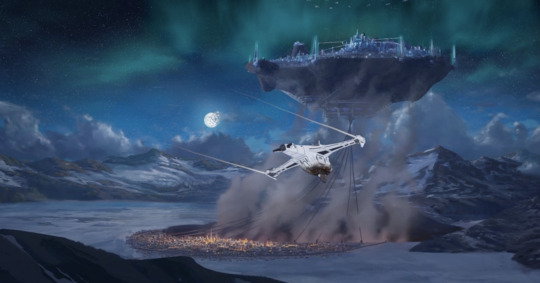
The only thing that ruins the view is the fleet of airships above, stationed like they’re expecting a battle. This seems to connect to the army we see Salem building in the post credits scene… but how in the world does Atlas know about something like that? Did Ironwood hear something and come up with an excuse to scramble the fighters? Or are they prepping for something else entirely? An attack from another kingdom?
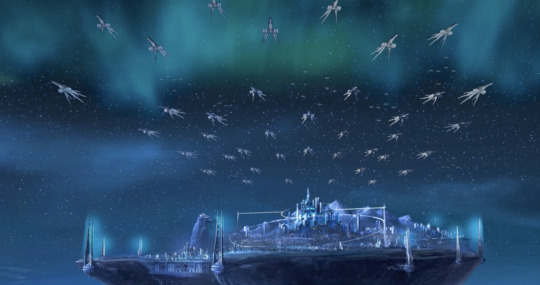
Regardless, we end on one of the personnel telling the group, “Welcome home.”
After the credits we see Emerald and Mercury utterly horrified by something below. We pan down to see Salem creating grimm from the pool… and then making them grow wings. My first thought was, “That guerrilla is going to need a much bigger wingspan to accommodate his weight.” My second thought was, “Oh. Flying monkeys.” That should tell you something about what my brain considers a priority.
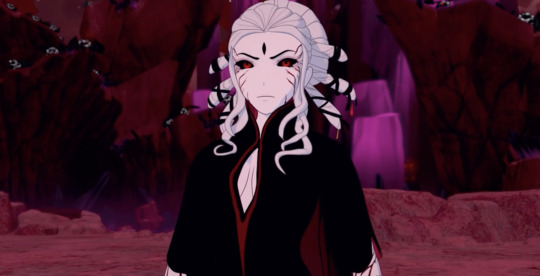
Hazel comes in and reminds Mercury and Emerald of an old saying: “If you want something done right, do it yourself.” That’s admittedly unexpected. Looks like after hearing that Ozpin reincarnated and ruined her plans for the Spring relic, Salem has decided to get her own hands dirty for once. I hope we get to hear more explanations for this because she’s apparently kept to the sidelines for generations and now, pretty randomly, decides to announce her presence to the world by leading an army? Who knows. It wouldn’t make less sense than anything else RWBY has given us lately.
And that’s it! We’re done! Hallelujah I need a break. Well, pseudo-break. I still intend to upload my other recaps to tumblr, dive back into our older episodes, and there are still asks to answer. So meta-ing is far from over, but it’ll be less intense than 4000+ words every Saturday lol.
Thank you all so much for reading. I’d sill be writing these with an audience of one (me), but it’s way better when there are others as well. So kudos to you all—and happy hiatus!
Other Details of Note
Neo is fully wearing Roman’s hat now and Cinder canonically wears Louboutin heels lol.
A bit of an odd note, but Cordovin’s repetitive screams about “This is your fault” almost sound painful. Like she’s physically in pain. Obviously that’s not the case in any literal manner, but there’s something horrible about watching the group destroy a part of the mechanical body she’s currently inhabiting and then just abandoning her, watching as she tires and fails to move. I really can’t emphasize enough how callous this group has become to anyone not in Team RWBY or JNR.
I enjoyed the red of the Leviathan glowing under the water as it moved. Nice touch.
“Never get used to that view,” Maria says, once again framing her eyes only as a joke and never a legit issue when it presumably would be.
Yang has ditched the casing on her arm after Adam’s attack. Maybe she and Blake can go arm/weapon shopping together.
124 notes
·
View notes